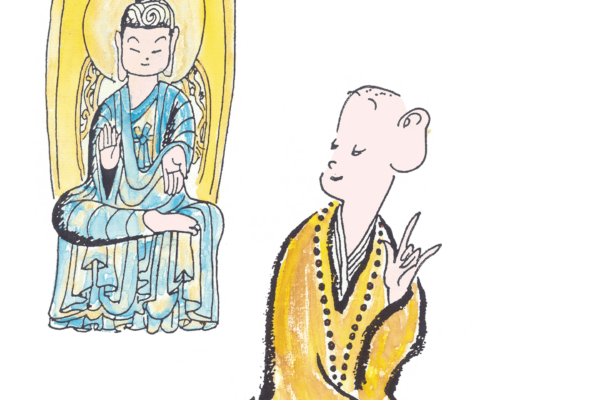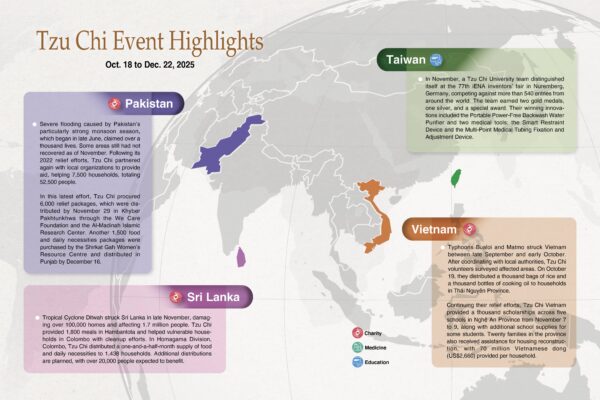COVID-19 has impacted the entire world in an unprecedented manner. Front-line medical workers are among those exposed to the greatest risks, while lockdown and stay-at-home mandates have threatened the livelihoods of the poor and underserved. During this time, Tzu Chi has overcome many challenges to provide aid and help lessen the impact of the pandemic.
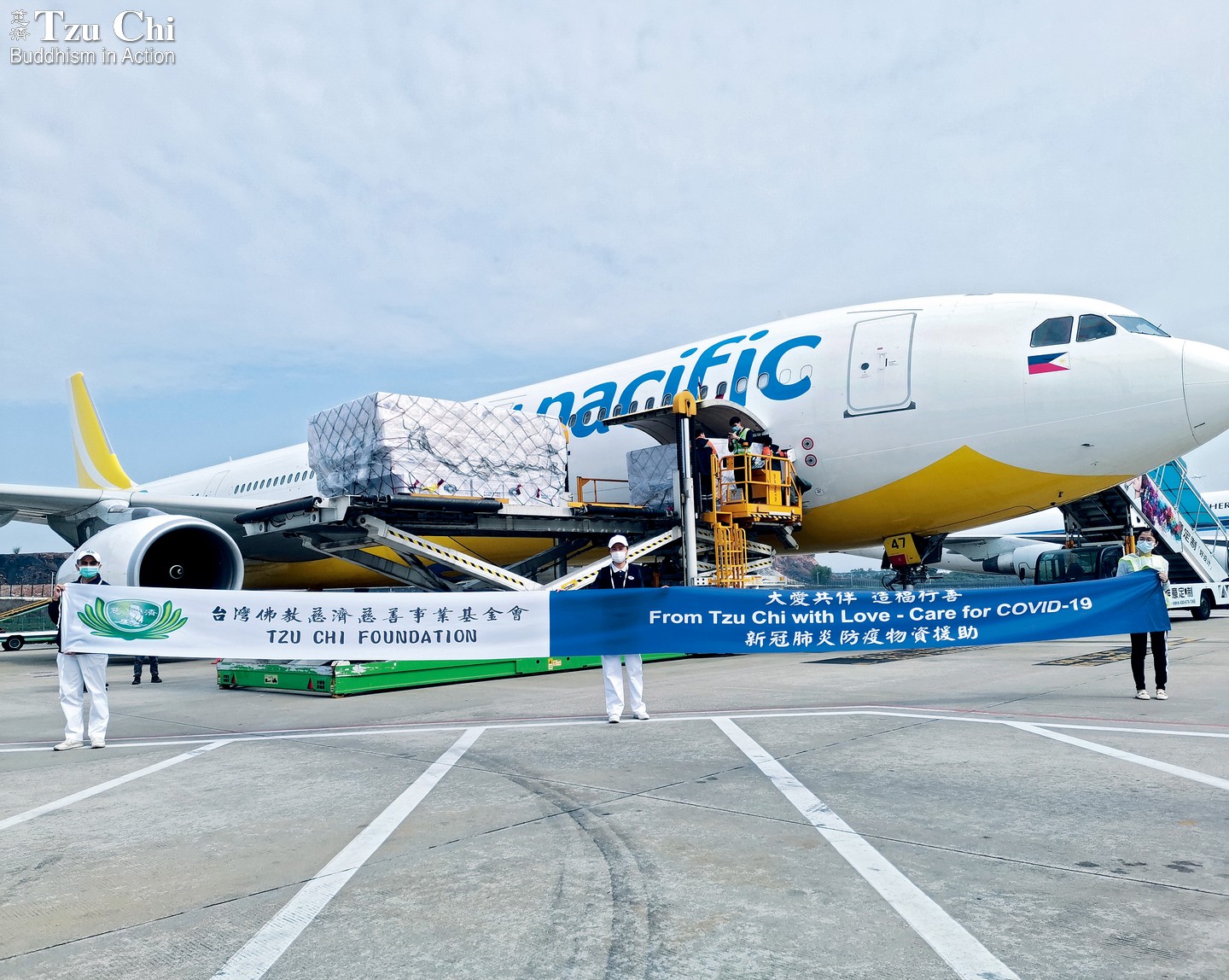
On April 25, 2020, a Cebu Pacific Air jet arrived at Guangzhou Baiyun International Airport, in Guangdong Province, China. Its purpose was to transport nearly 50,000 protective gowns and 2,000 face shields donated by Tzu Chi to the Philippines for frontline medical workers in the country. In April alone, Tzu Chi volunteers in Guangzhou helped complete dozens of such delivery missions. LI HONGLI
Guarding Medical Workers and Helping the Underprivileged
By Ye Zi-hao
Translated by Wu Hsiao-ting
Though Taiwan’s efforts in combating COVID-19 have been very effective, the island will be in peril until the disease is contained worldwide. The economy of Taiwan is likewise intertwined with the economies of other countries. Therefore, helping other countries around the world fight and overcome the disease is a wise and necessary course for Taiwan.
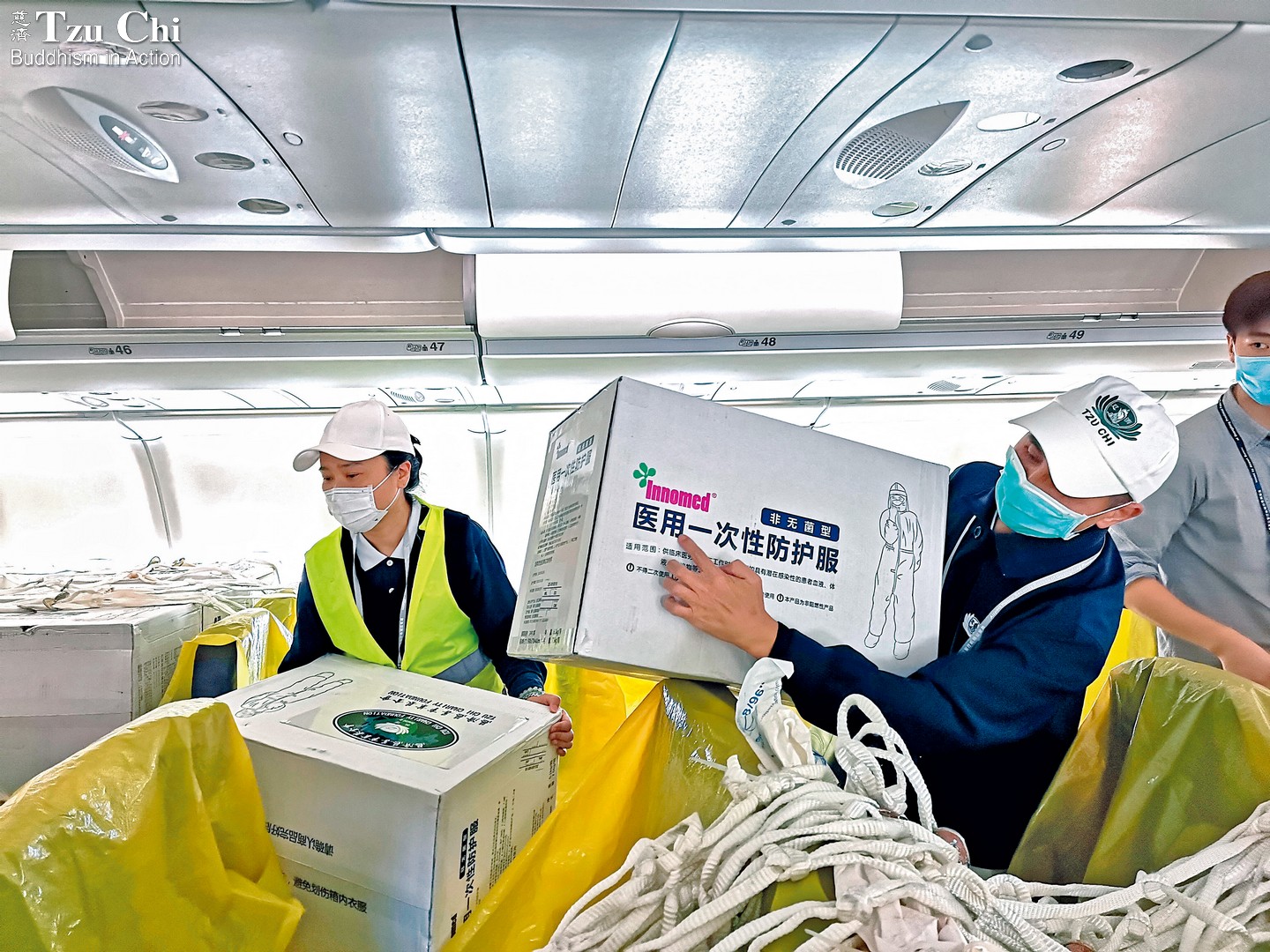
Tzu Chi volunteers in Guangzhou, China, move medical supplies into a Cebu Pacific Air passenger plane to be transported to the Philippines. LI HONGLI
By early July 2020, COVID-19 had swept through more than 200 countries and territories, infecting over 11 million people and killing 530,000. The destructive force of this global plague is such that some people have likened it to a bomb-free World War III.
When the epidemic first broke out, Taiwan was considered one of the most at-risk regions of a major outbreak outside of China due to its proximity and transport links to the latter. However, Taiwan’s geographic advantage of being an island, its tight border control following the outbreak, and other effective preventive measures instituted by the government averted a disaster. The Taiwanese people should also be lauded for playing their part in the battle against COVID-19. As urged by the government, they wore masks when needed, washed their hands frequently, and observed social distancing. As of early June, Taiwan had recorded just seven deaths and less than 450 confirmed infections. Because there had been no locally transmitted cases for over 50 days straight, many anti-coronavirus measures were lifted by the government, and life picked up as normal on the island. Taiwan’s impressive performance in the fight against the coronavirus has won attention the world over and received extensive media coverage.
Though Taiwan has remained relatively untouched by the pandemic, the disease has taken many other areas around the world by storm. America and Europe have been hit especially hard. At its height in those regions, the daily number of people dying there was many times the total number of infections in Taiwan. Japan, Korea, Singapore, the Philippines, and Indonesia—countries closer to Taiwan—have registered high numbers of infections too.
As the poet John Donne penned, “No man is an island.” Likewise, no country can realistically isolate itself from the rest of the world in today’s global situation. However good a job Taiwan has done in combating COVID-19, it will be in peril until the disease is effectively contained worldwide. The economy of Taiwan is also intertwined with other countries, and will be affected as other economies are impacted by the pandemic. Therefore, whether for humanitarian reasons or for its own economic interests, helping other countries in the world fight the disease is a wise and necessary course for Taiwan. The Tzu Chi Foundation, based in Taiwan, has been doing just that since the beginning.
The early days of the outbreak
“We started taking action on January 23, the day before Chinese New Year’s eve, the day Wuhan was put on lockdown,” said Simon Shyong (熊士民), deputy CEO of the Tzu Chi charity mission. “The next day, Master Cheng Yen issued a letter to the Tzu Chi volunteers in China, wishing them well and urging them to take precautionary measures, avoid crowds, and most importantly, eat vegetarian to help protect life.”
In fact, Tzu Chi headquarters in Hualien, eastern Taiwan, was on alert as early as the end of last year, as soon as news began to spread about the appearance of a viral pneumonia in Wuhan, China. The situation escalated quickly. An anti-coronavirus team consisting of the CEOs and deputy CEOs of the four Tzu Chi missions was formed on January 26, the second day of Chinese New Year. Two days later, the first domestic case was diagnosed in Taiwan. A morning meeting was established daily at the headquarters to organize and coordinate Tzu Chi’s response to the epidemic.
By the end of January, the number of infections in China had hit 9,000, with a death toll surpassing 200. Although Taiwan had recorded just ten confirmed cases by that time, there was such a high local demand for surgical masks that the Taiwanese government banned their export on January 24. As a result, during the earlier days of the outbreak, all the anti-coronavirus supplies that Tzu Chi donated to areas hit hard by the epidemic were purchased outside of Taiwan. From late January to the end of February, volunteers purchased and prepared supplies in the United States, Indonesia, and other countries not yet noticeably affected by the epidemic, and had them delivered to Wuhan and other places in China. Meanwhile, nuns at the Jing Si Abode, the convent established by Master Cheng Yen, and Tzu Chi volunteers in Taiwan mobilized to make cloth masks to relieve shortages. The masks they started producing on February 10 were provided to people in Taiwan and abroad.
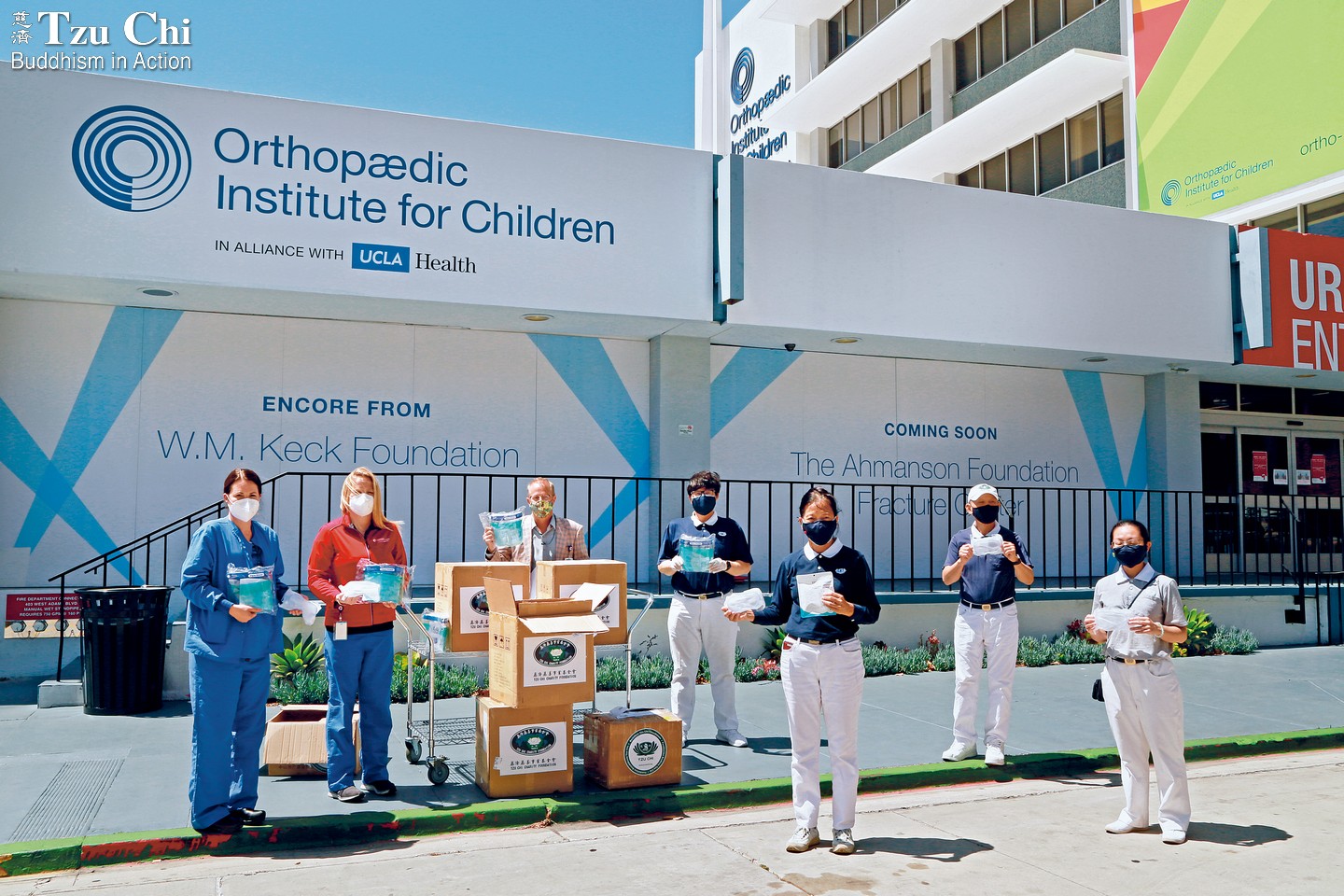
With the United States facing a severe shortage of personal protective equipment, Tzu Chi volunteers there donated N95 masks and safety goggles to the Orthopedic Institute for Children, which is in alliance with UCLA Health. LUO SHU-LI
Religions joined hands
The COVID-19 situation took an unexpected turn in March and April. Areas that had previously recorded few confirmed cases, such as Europe and North America, began to witness a sharp increase in infections and deaths. It was as if a levee had been broken by an unstoppable flood—the number of people that needed to be tested and treated in those areas climbed exponentially. Severe shortages of sickbeds, medical professionals, and personal protective equipment (PPE) ensued.
The pandemic accelerated in India and Indonesia too, turning those nations from exporters of PPE supplies to areas that needed help. The exact opposite happened in China. As the coronavirus situation began easing in April in that country, lockdowns were gradually lifted and production lines resumed. The country turned from needing aid to becoming a major supplier of medical supplies to other nations.
As a result, Tzu Chi’s aid reflowed too. Volunteers began making purchases in China and other areas in Asia and had them delivered to countries around the world that needed help. Among the 72 countries and territories Tzu Chi has helped so far, the aid to two countries is especially worthy of mention because of its significance in cross-religion cooperation.
One of those countries is the Vatican City. “Priests and nuns from the Vatican expose themselves to infection when they visit the sick or deceased,” said Simon Shyong. “We reached out to help so these front-line workers could be better protected.” Shyong explained that a physician at Hualien Tzu Chi Hospital, in eastern Taiwan, has a brother who is a priest at the Vatican. Tzu Chi’s aid mission to the Vatican came about due to the link between these two brothers.
After the face masks donated by Tzu Chi arrived at the Vatican, they were distributed to members of religious orders as well as to medical professionals. The protective gear helped prevent the spread of the coronavirus and soothed the users’ minds. On April 18, authorities at the Vatican emailed the foundation, thanking Tzu Chi volunteers around the world in the name of Pope Francis for reaching out to people in need at a time when the world was facing a huge challenge.
The other country was Italy. Father Giuseppe Didone is a priest from Italy who has dedicated half a century to serving people in Yilan, northern Taiwan. He made an appeal in early April to Taiwanese people for donations to the fundraising center of Camillian Saint Mary’s Hospital Luodong, Yilan. The money was needed to purchase emergency medical supplies, including surgical masks and protective gowns, for medical professionals in Italy, which had been hit hard by COVID-19. His appeal resulted in a warm response. Support poured in from Taiwanese citizens, but Father Giuseppe and his team needed further help in purchasing medical supplies from China. That’s where Tzu Chi came in.
Yen Po-wen (顏博文), CEO of the Tzu Chi charity mission, personally visited Camillian Saint Mary’s Hospital to meet with the priest and his team, and to learn how Tzu Chi could help. After learning about the Father’s expectations, personnel at Tzu Chi headquarters contacted Tzu Chi volunteers in China to help Father Giuseppe find manufacturers, sign contracts, place orders, and arrange for delivery to Italy. The priest’s wish to help his home country was fulfilled, and love from the Taiwanese people was transformed into severely needed medical provisions for those who needed them most.
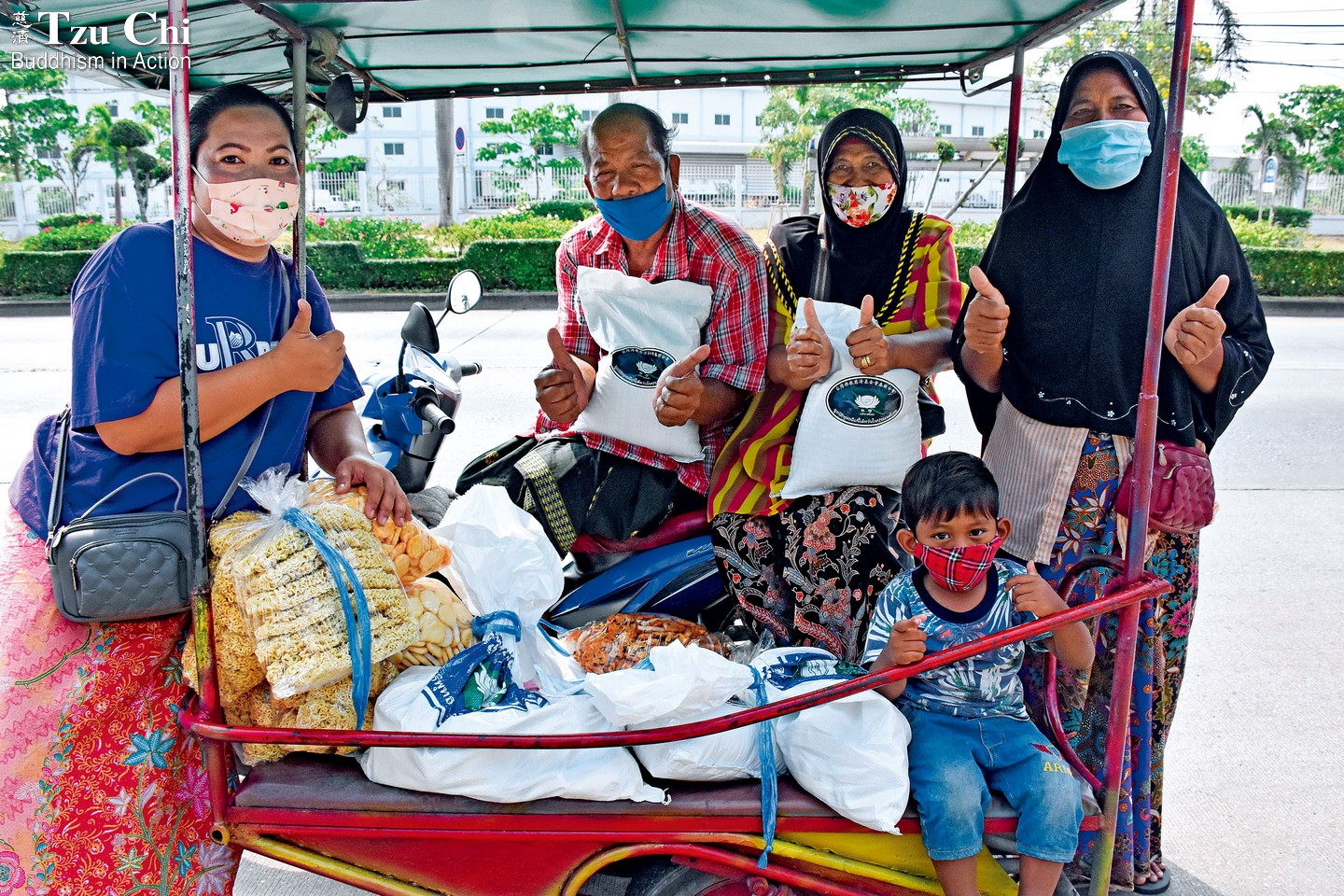
In late April 2020, Tzu Chi volunteers in Thailand distributed packages of daily necessities in Bangkok to people whose lives were impacted by the pandemic. Items distributed included rice, cooking oil, sugar, salt, and vegetable and fruit juice. PINTICHA JANSUKSRI
Challenges abounded
“The anti-coronavirus supplies—such as face masks—that Tzu Chi has sent to hard-hit countries came mostly from China,” said Simon Shyong. “Some were made in Mexico. We also purchased some hand sanitizer from Thailand.” In speaking of the purchase and transportation of the aid provisions, Shyong mentioned that Tzu Chi possessed an advantage: “We didn’t have to go through intermediary agencies when we made the purchases,” Shyong said. “Since there are Tzu Chi employees and volunteers in China, they could go directly to a factory to check out the quality of the goods we had ordered and help make sure that the deliveries were on schedule.”
Even with this advantage, the foundation encountered many logistical challenges in carrying out the aid mission for COVID-19. For example, due to the worldwide surge in demand for face masks, governments all over the world scrambled to buy the masks they needed to fight the pandemic. As demand spiked, so did the prices. It was therefore difficult to find manufacturers that could deliver quality goods at a fair price on time.
Another challenge arose in April, as the Chinese government began tightening its control and inspection of anti-coronavirus supplies. The purpose was to prevent those supplies of poor quality from being exported from the country, but the increased quality control added to the complexities of the purchase procedure.
The transportation of goods also became more difficult. In order to curb the spread of the novel coronavirus, countries worldwide had enacted travel restrictions and strict border control measures, leading to the cancellation of many flights by airline companies. Some routes witnessed a reduction of 80 or even 90 percent of their flights. And as the number of flights was slashed, the cost of transportation rose to twice the original level.
Yet another problem was caused by the collection of goods. Tzu Chi has helped over 70 countries and territories during the pandemic, some of which have never been visited by volunteers. How could Tzu Chi make sure the goods were properly delivered? Who could go to collect the supplies upon arrival? Should volunteers from other countries travel to the destination countries to help? These were among many of the issues that confronted Tzu Chi staffers and volunteers as they worked to help others weather the pandemic.
In the midst of these challenges, Tzu Chi has received a lot of kind-hearted assistance that has made its mission easier. Cebu Pacific Air, a Philippine airline, helped the foundation transport aid provisions at a discount. On April 25, the airline company sent a chartered plane to Guangzhou Baiyun International Airport, in Guangdong Province, China, to fetch 49,900 protective gowns and 2,000 face shields Tzu Chi was sending to the Philippines. With permission from the airport authorities, Tzu Chi volunteers from Guangzhou entered an access-controlled area at the airport and helped move the items, carton by carton, into the chartered plane to be flown to the Philippines.
Indonesia’s Air Force and a state-run airline company also helped Indonesian Tzu Chi volunteers transport medical supplies, including COVID-19 test kits, face masks, protective clothing, and oxygen concentrators, from China to Jakarta, Indonesia’s national capital. After the supplies had cleared customs in Jakarta, they were escorted by police to the local Tzu Chi Jing Si Hall before being delivered to medical facilities in various places in Indonesia.
“As for the United States, we worked with some organizations to have Tzu Chi’s supplies transported there,” Simon Shyong explained. “They provided airplanes to transport our goods.”
In places where there are Tzu Chi offices or near which volunteers live, local volunteers or employees can go personally to collect goods when they arrive. In places where there are not, the foundation asks recipient organizations or agencies to collect the goods at airports and follow up with confirmation of receipt.
Take Spain, where there are no Tzu Chi volunteers, for example. When organizations or government health agencies in that country appealed to the foundation for aid, Tzu Chi readily responded. All Tzu Chi asked of them was “to send us a few photos to let us know the supplies had safely arrived, and provide us with information about where they had distributed the items and who had benefited,” Shyong said.
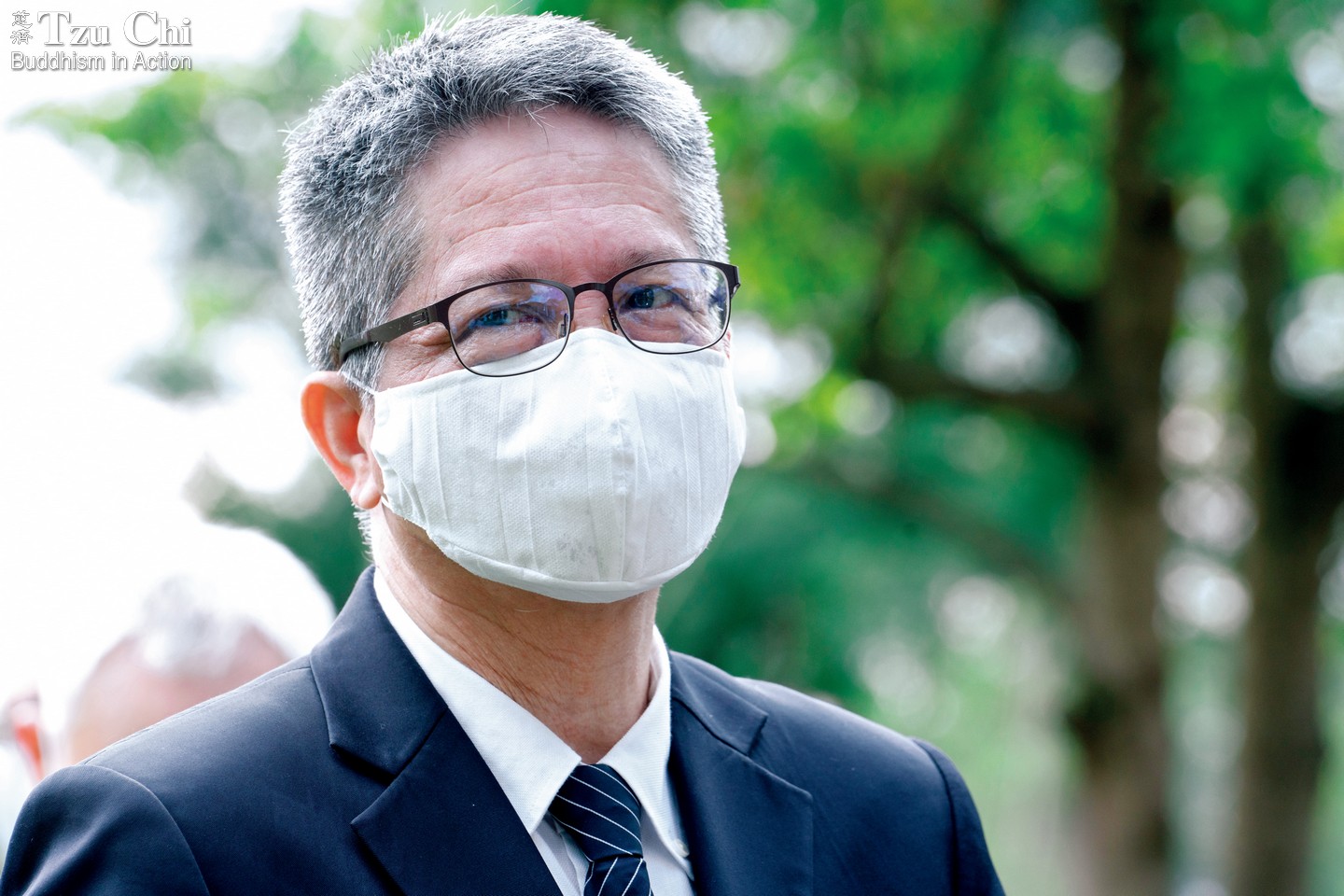
Simon Shyong, deputy CEO of the Tzu Chi charity mission, has participated in Tzu Chi’s relief efforts for the pandemic since late January 2020. HSIAO YIU-HWA
Alleviating economic impacts
By early July, Tzu Chi had provided more than 20,433,000 aid items to 72 nations. Countries receiving aid from the foundation include the United States, one of the hardest-hit nations; the Philippines, which lies near Taiwan; and South Africa and Mozambique in Africa. Volunteers not only purchased medical provisions for delivery to those who needed them—they also mobilized to make cloth masks, face shields, and protective clothing. Volunteers also urged people to wear masks, wash their hands often, and observe social distancing to help stop the transmission of the virus.
The foundation plans to aid 14 more countries. “It’s no easy task conducting the relief operation this time, given the large number of countries and regions on our aid list,” Simon Shyong said. “Despite the difficulties, we are very grateful to have this opportunity to help.” The deputy CEO commended Tzu Chi volunteers and staffers at the Hualien headquarters who oversee Tzu Chi’s international relief work for keeping their cell phones on 24 hours a day so that they could quickly respond to a situation. Everyone worked hard so that Tzu Chi’s aid could be delivered to the front lines as soon as possible.
Besides providing medical supplies, the foundation also extended assistance to people whose financial situations had become difficult as a result of the outbreak. In Taiwan, the foundation started by helping volunteers whose livelihoods had been seriously affected by the pandemic—for example, those who ran businesses which had come to a standstill due to the pandemic. “We’re also conducting a survey on families who used to receive aid from Tzu Chi,” Shyong said. “If we discover that they are experiencing financial difficulties again [due to COVID-19], we’ll offer help to them so that in addition to government aid, they can have some extra help from Tzu Chi.”
As for places outside Taiwan, the deputy CEO pointed out that currently volunteers in 35 countries had made plans or were already implementing plans to help people who had lost their jobs or were having difficulty making ends meet as a result of the outbreak. In the Philippines, for example, despite lockdown measures implemented by the government, volunteers managed to overcome many challenges and distributed rice to many needy families. Social distancing was dutifully observed during the distributions, which were conducted in an orderly manner. From mid-March to early June alone, volunteers helped 100,000 households.
The United States has recorded the highest numbers of infections and deaths to date worldwide. While the country works to fight the infection, unemployment or unpaid leaves of absence have taken a toll on many people’s finances. They need help as much as the underserved people in other countries. In response, Tzu Chi prepared some instant rice and noodles and had them sent to Tzu Chi offices across the United States to be distributed to the needy. “We’d gotten the food ready by early May and had it shipped to the United States in the fastest way possible,” said Shyong, who for many years had lived in the state of Texas in the U.S.
The impact inflicted by the pandemic may not be as tangible as the physical destruction wreaked by an earthquake, typhoon, or tsunami, but its effects are so far-reaching that billions of people around the world have been affected. Given the extent of the impact, the scale of mobilization by Tzu Chi has also been unprecedented. Though volunteers around the world can only move in limited areas in their respective countries, they can still connect and work effectively together via the Internet to allow their care to reach as many people as possible.
“We do what we consider is our duty to do,” said Simon Shyong. With the world still reeling from the pandemic, it’s every volunteer’s hope that more people, while taking measures to protect themselves, can put their love into action to help repair a world that is badly in need of healing.
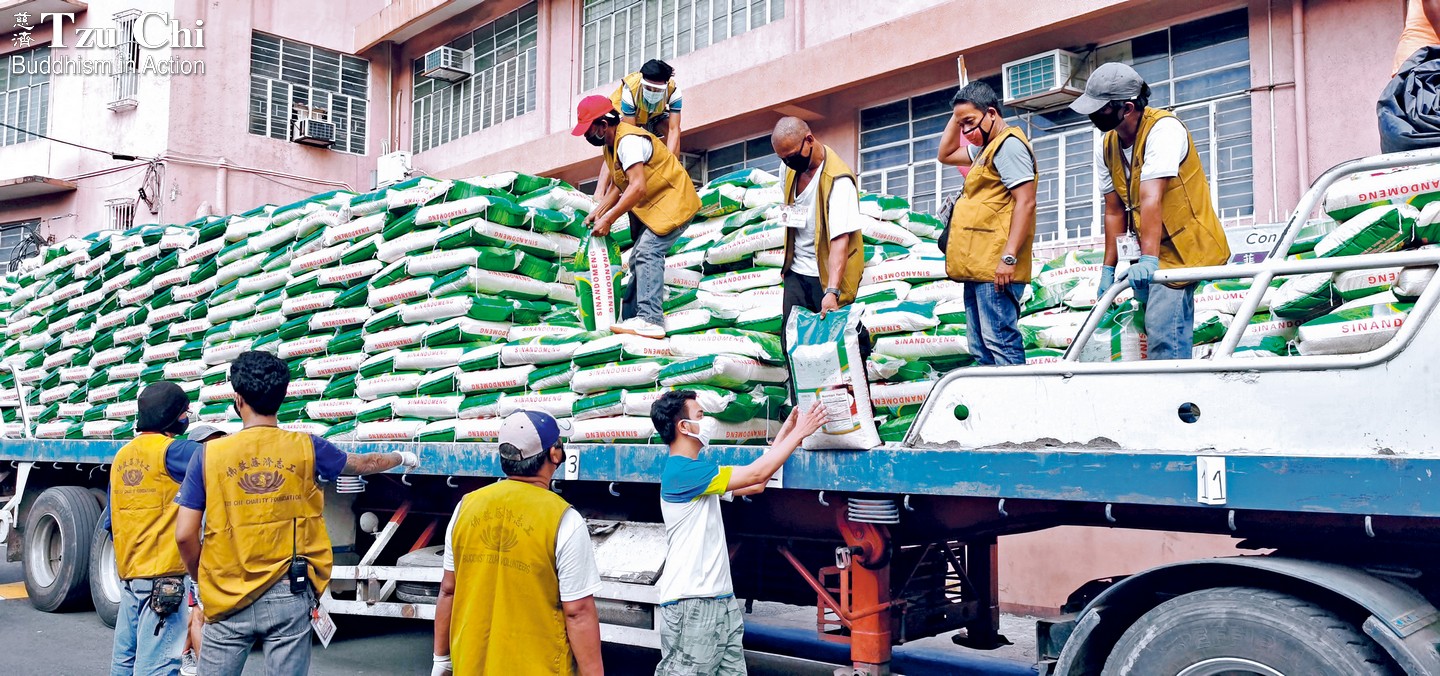
Tzu Chi volunteers in the Philippines had to overcome many challenges, from purchasing the rice, to its transportation, to finally distributing it to needy families during the lockdown. CHEN YU-YI
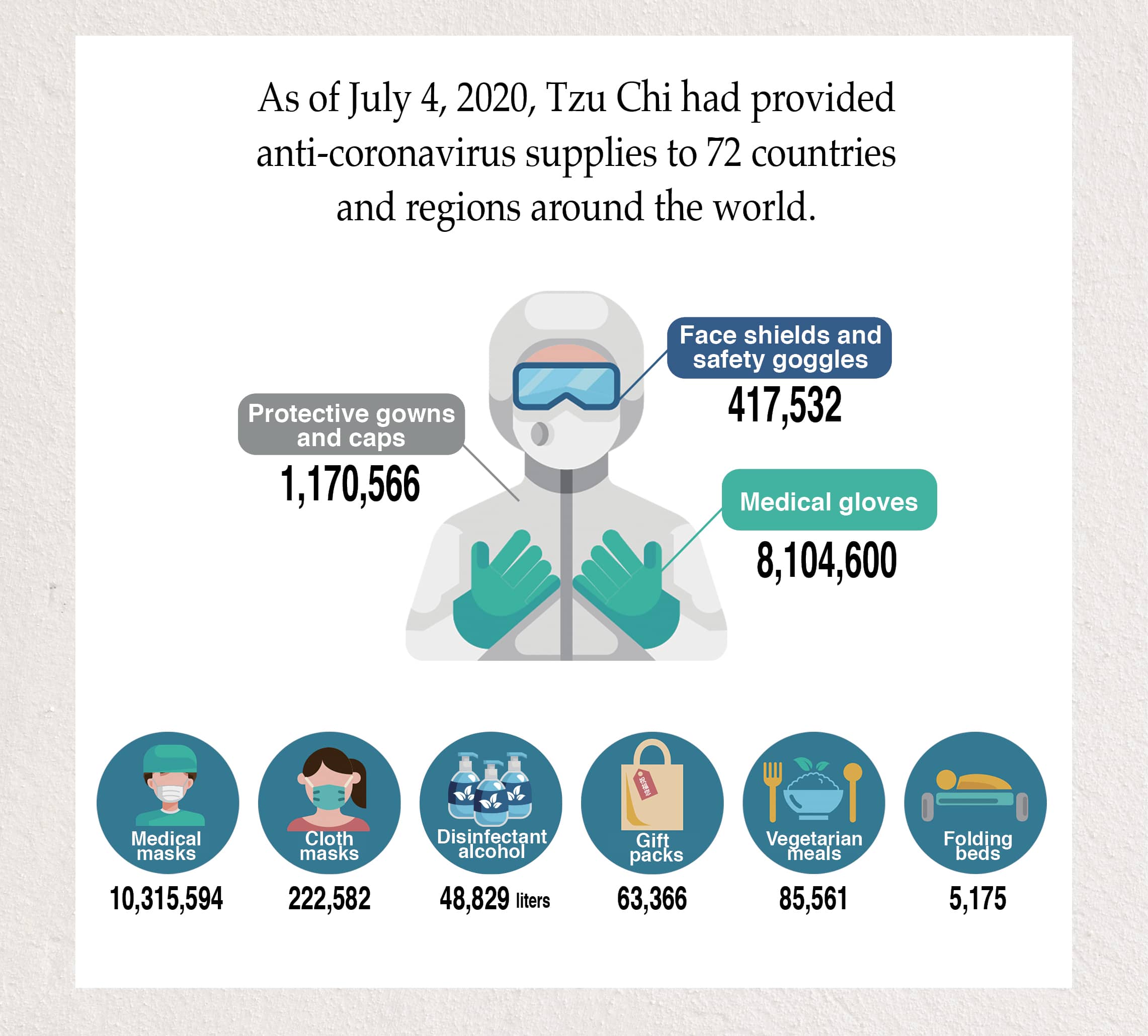
●
Asia and Oceania
The Tzu Chi Foundation has provided anti-coronavirus supplies to the following countries and regions in Asia and Oceania:
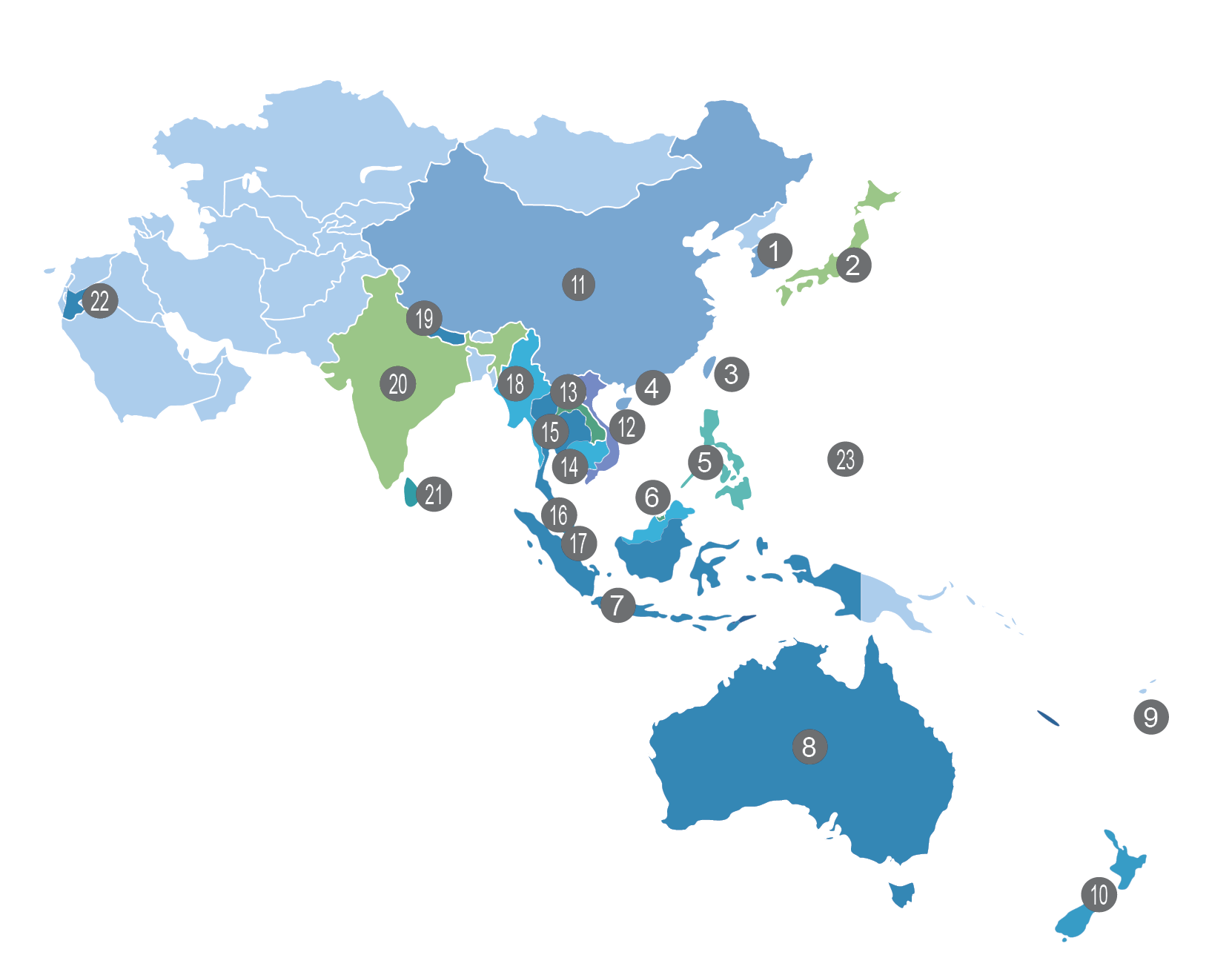
1. Korea
2. Japan
3. Taiwan
4. Hong Kong
5. The Philippines
6. Brunei
7. Indonesia
8. Australia
9. American Samoa
10. New Zealand
11. China
12. Vietnam
13. Laos
14. Cambodia
15 Thailand
16. Malaysia
17. Singapore
18. Myanmar
19. Nepal
20. India
21. Sri Lanka
22. Jordan
23. Saipan
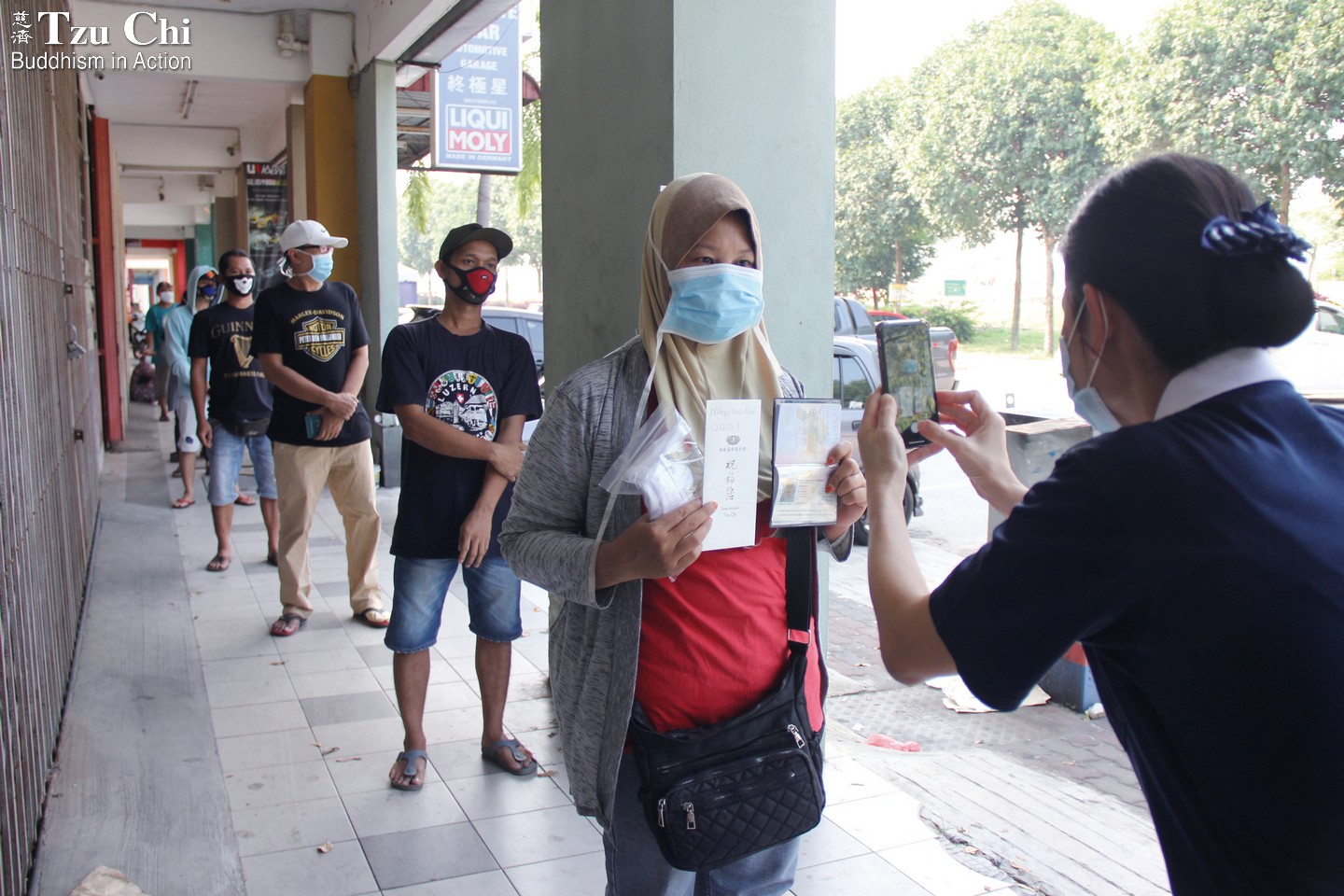
KOH POO LENG
Klang, Malaysia
Observing social distance during an aid distribution, a foreign migrant worker holds up her passport and a Tzu Chi blessing card for a volunteer to photograph. The photo serves as proof of receipt for shopping vouchers from the foundation. With the Movement Control Order extended again and again, many foreign workers were forced out of a job or forced to take unpaid leaves of absence, plunging them into financial difficulties. Tzu Chi Kuala Lumpur and Selangor set up a hotline to help people like them get through this difficult time.
Zamboanga, the Philippines
Cluster infections of COVID-19 occurred in Zamboanga after the pandemic broke out around the world. Tzu Chi volunteers provided aid, including medical masks and infrared thermometers, to more than 50 local hospitals to help fight the infection in the area. With the help of some Muslim students, volunteers also transported rice to outlying islands for distribution to the needy there. As of early June, Tzu Chi had distributed rice to more than 100,000 families in the Philippines.
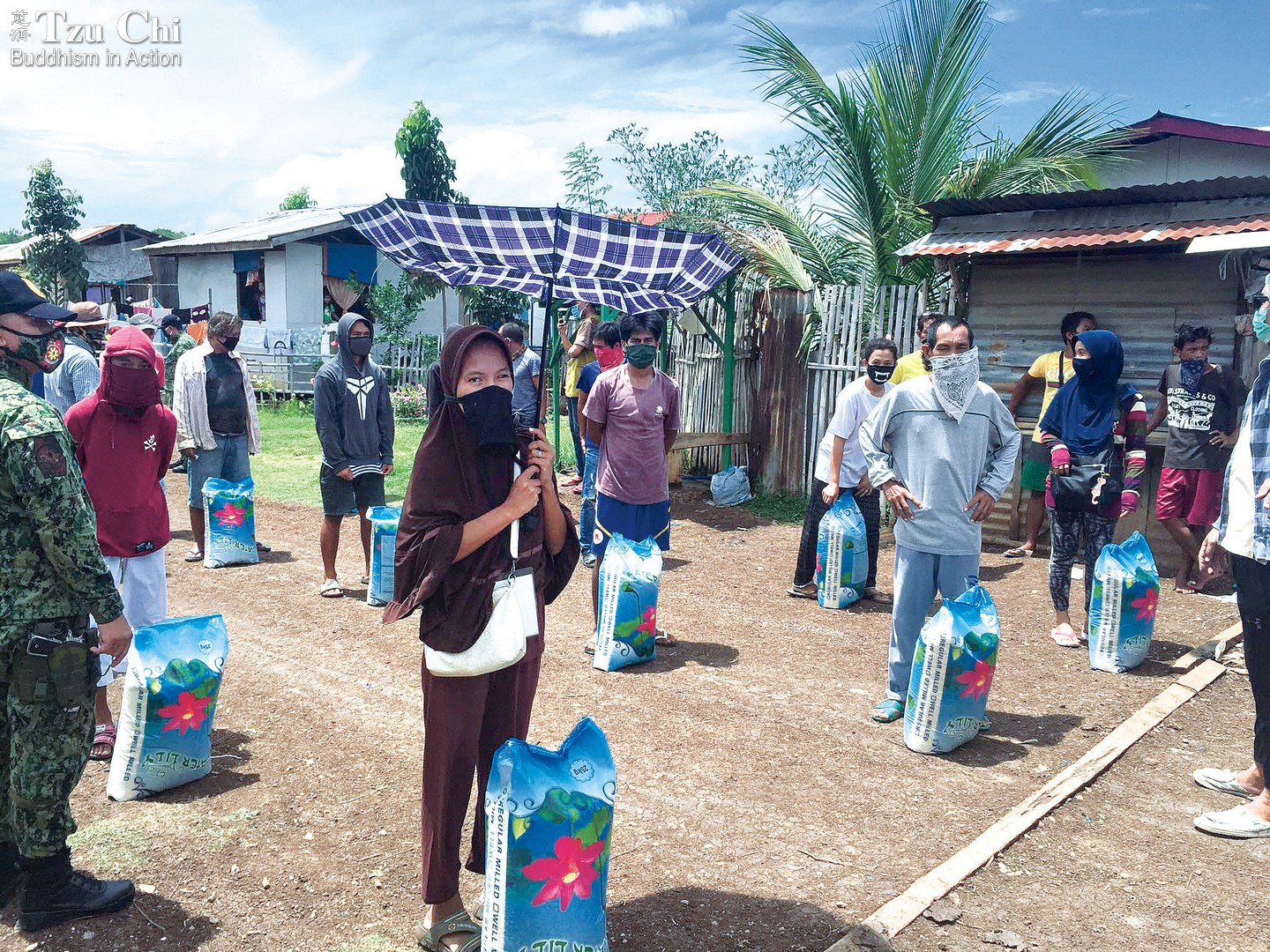
COURTESY OF YANG WEI-SHUN
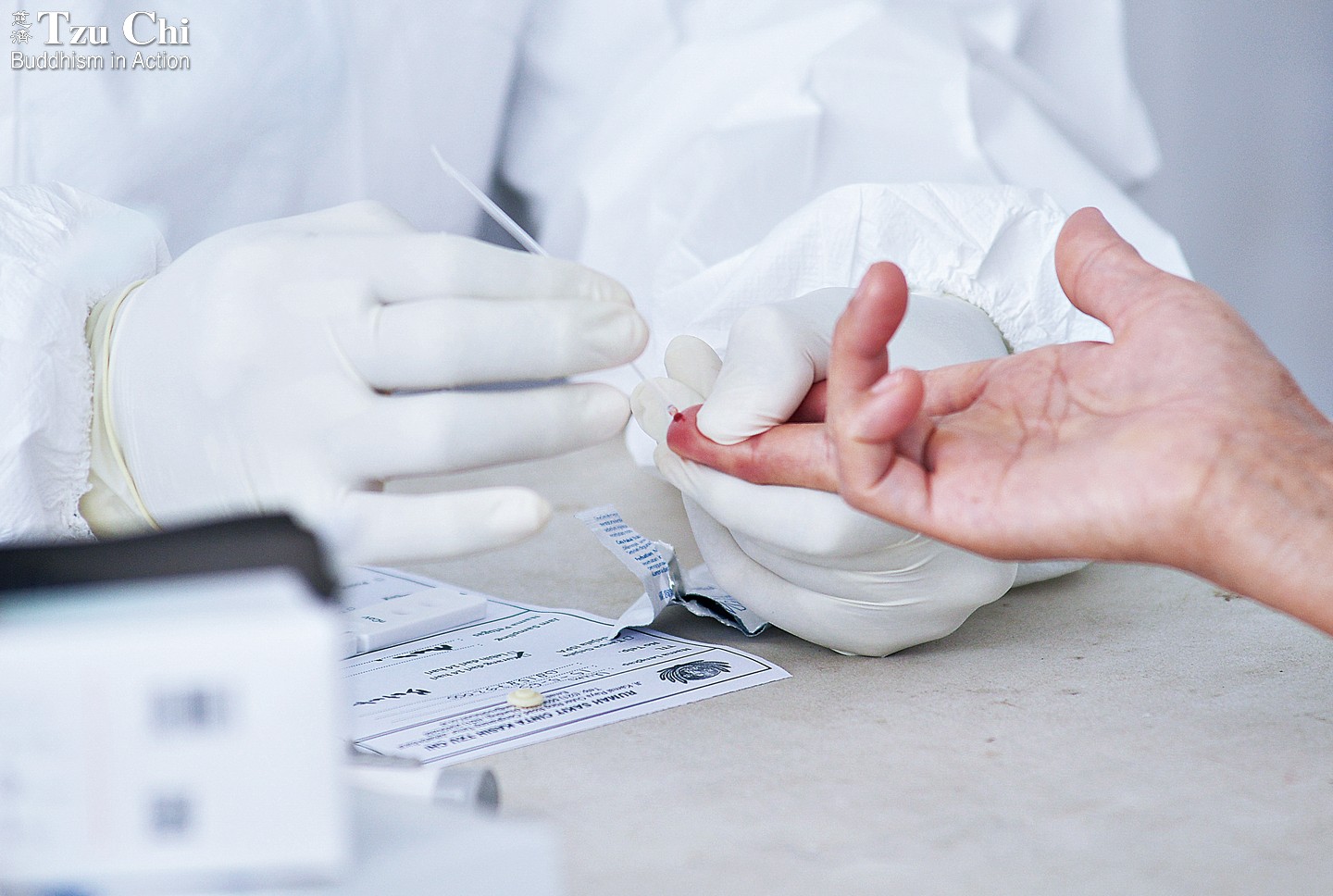
ARIMAMI SURYO ASMORO
Jakarta, Indonesia
Tzu Chi Indonesia, working with the Indonesian Chamber of Commerce and Industry, raised enough money to buy a million COVID-19 test kits, which they then donated to government and medical agencies. Sugianto Kusuma (郭再源), deputy CEO of Tzu Chi Indonesia, said that the price of the test kits in March was prohibitive, but since they were racing against time to fight the disease, they decided to make the purchase anyway. Saving lives should take priority over everything else.
Phnom Penh, Cambodia
On June 10, more than 800 needy families in Prek Pnov received a month’s supply of rice, cooking oil, and salt from Tzu Chi. As garbage salvagers, plasterers and bricklayers, or street vendors, their income had diminished as a result of the pandemic. Even so, they donated what little money they could spare during the distribution to help others. They wanted to pay forward the love they had received from kind-hearted donors around the world.
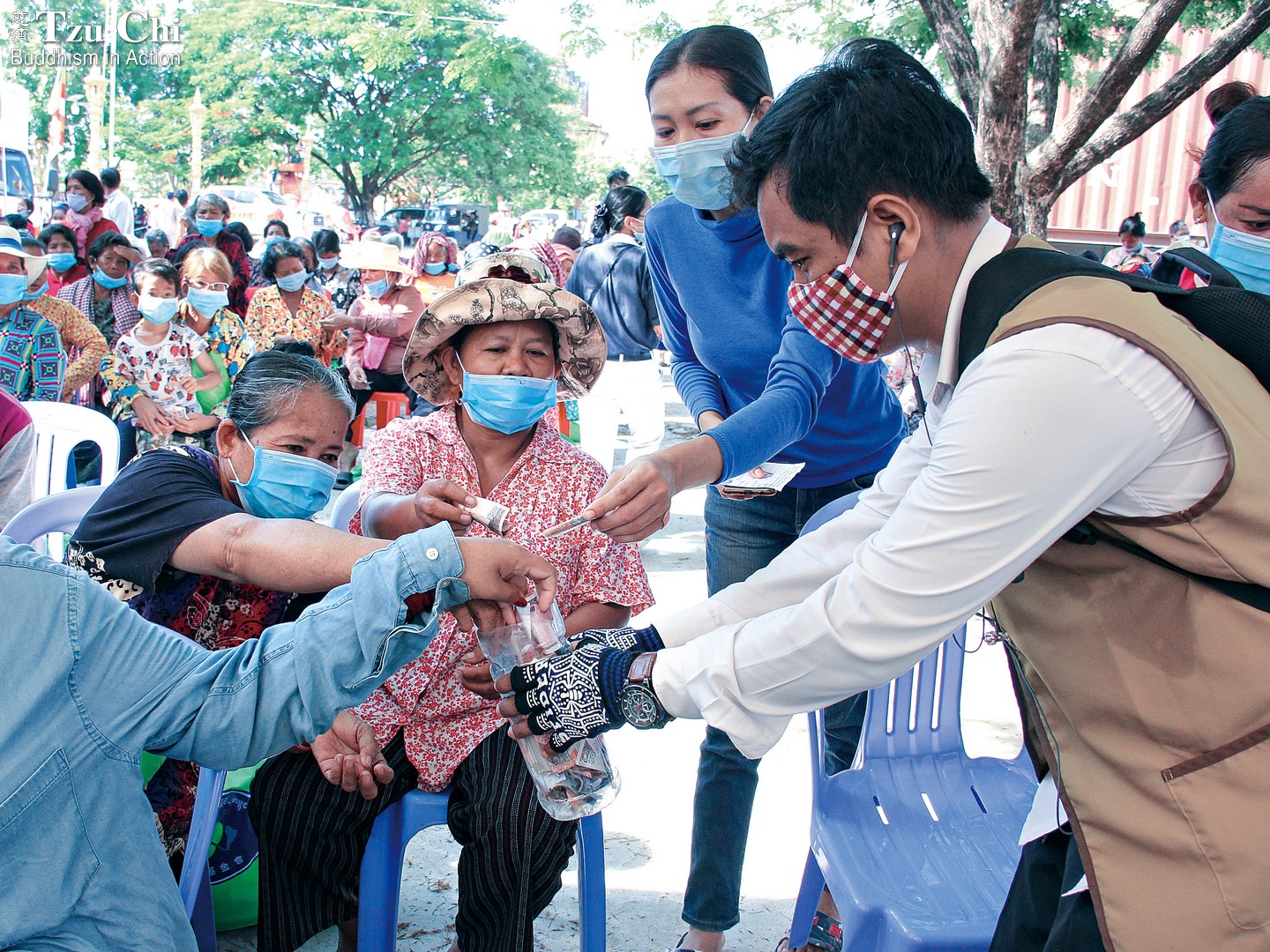
COURTESY OF TZU CHI CAMBODIA
The Americas
The Tzu Chi Foundation has provided anti-coronavirus supplies to the following countries and regions in North and South America:
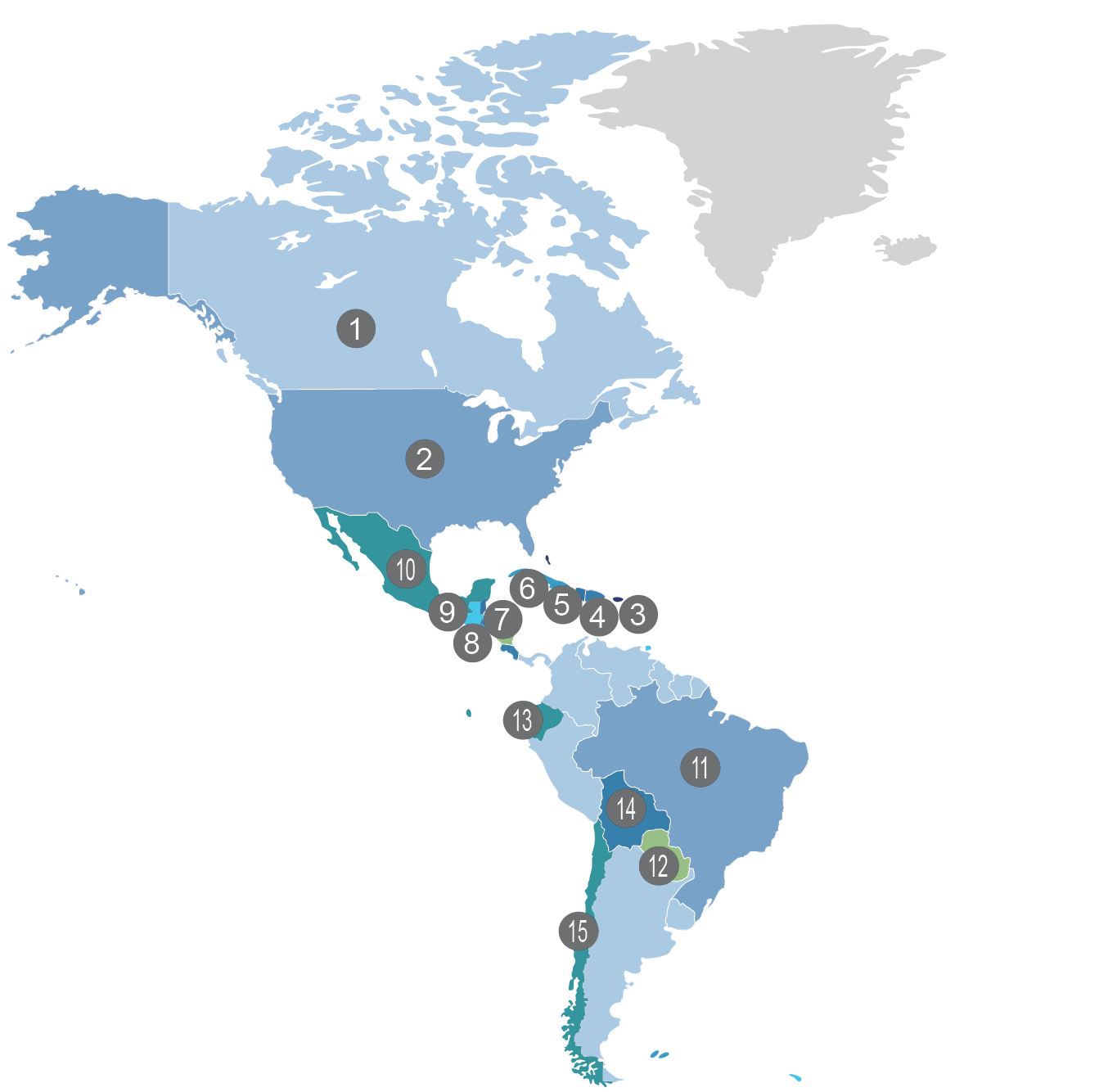
1. Canada
2. The United States
3. Saint Martin
4. Puerto Rico
5. Dominican Republic
6. Haiti
7. Honduras
8. El Salvador
9. Guatemala
10. Mexico
11. Brazil
12. Paraguay
13. Ecuador
14. Bolivia
15. Chile
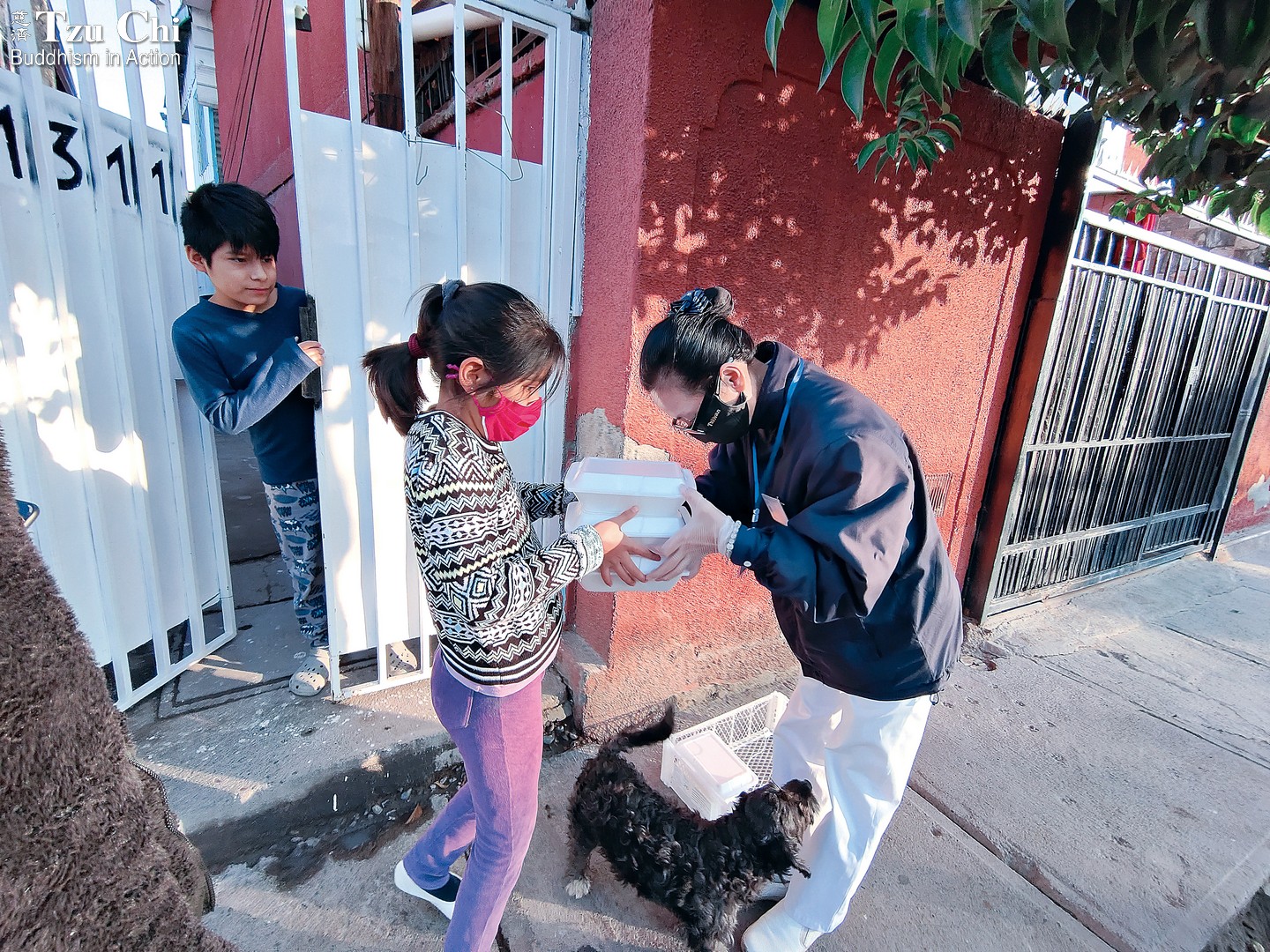
COURTESY OF TZU CHI SANTIAGO
Santiago, Chile
The pandemic has thrown many underserved people out of work, making their lives even more difficult. Tzu Chi volunteers joined hands with teachers at Escuela Básica Likan Antai, an elementary school in Conchalí, Santiago Province, to help struggling families through this difficult time. They used donated food ingredients to cook for local underprivileged households and then delivered the meals to them.
New York, the United States
The United States has the highest number of confirmed coronavirus cases in the world, with New York State being one of the worst-hit areas. Tzu Chi volunteers started delivering personal protective equipment to various hospitals in New York City in March. In April, they started donating anti-coronavirus supplies to nursing and rehabilitation facilities. When volunteers from Long Island delivered supplies to Oyster Bay Manor, an assisted living facility, a nursing staffer there, choked up with emotion, said to the volunteers in American-accented Mandarin, “Xie xie [thank you].”
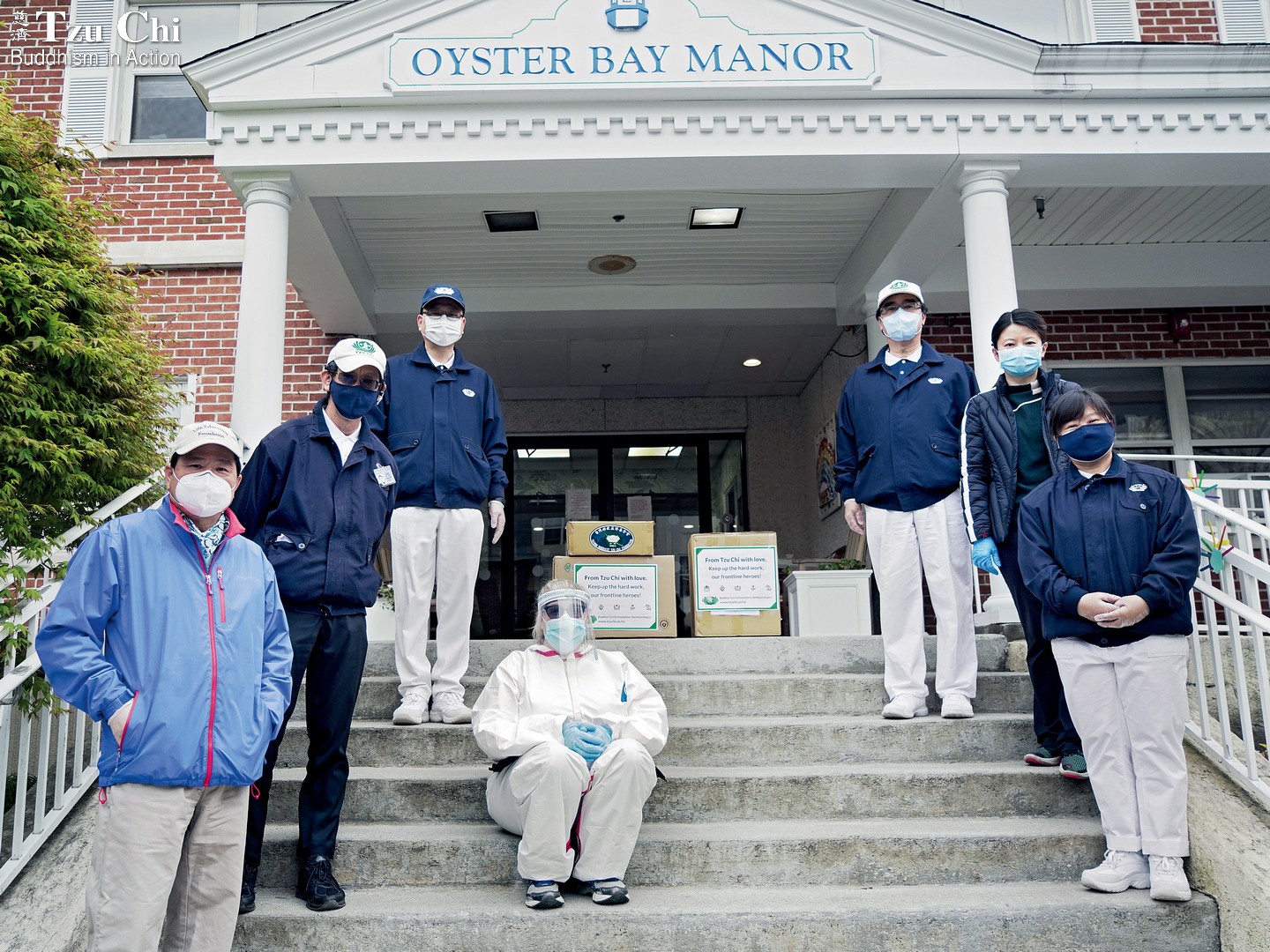
GARSON ORMISTON
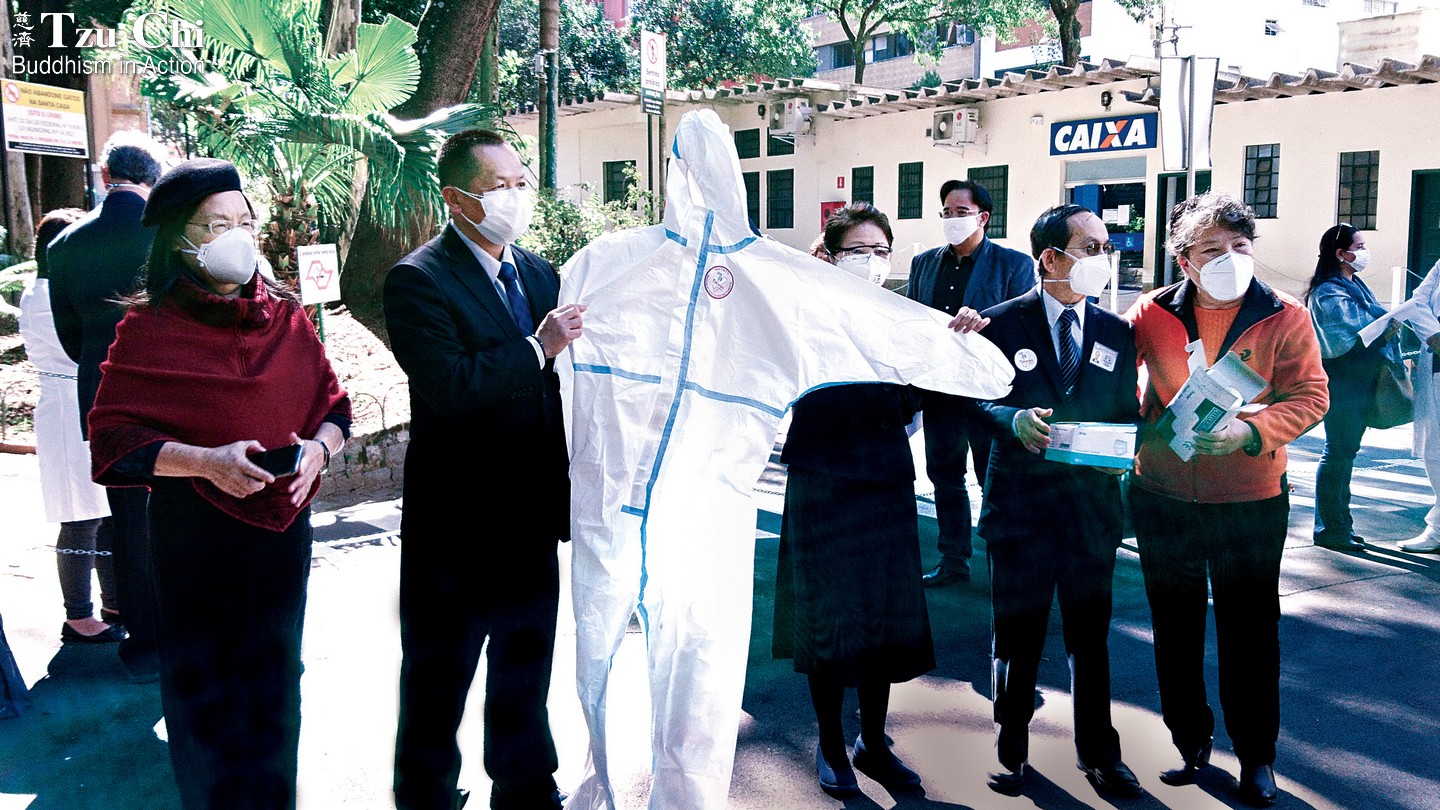
LI JIN-MAN
São Paulo, Brazil
Brazil has the second highest number of cases of COVID-19. By June 19, the country’s case count had passed a million. Tzu Chi donated surgical masks, protective clothing, safety goggles, and medical gloves to seven local hospitals in May to help protect frontline medical workers during the pandemic. Santa Casa de Misericórdia, founded over 400 years ago, was one of the hospitals benefiting from the donation. The Santa Casa hospital system, comprising five hospitals, provides treatment for people from Brazil and other South American countries, serving over 10,000 patient visits a day.
Toronto, Canada
Originally equipped with just nine oxygen concentrators, North York General Hospital decided to purchase 130 more to meet the demand of COVID-19 patients. Tzu Chi volunteers raised money to help the hospital equip itself against the coronavirus. In just four days, volunteers exceeded their initial goal of 50,000 Canadian dollars (US$36,800), and raised a total of 75,200 dollars (US$55,400). Hospital personnel thanked the foundation for its help, saying that the donated equipment will help patients now and for many years to come.
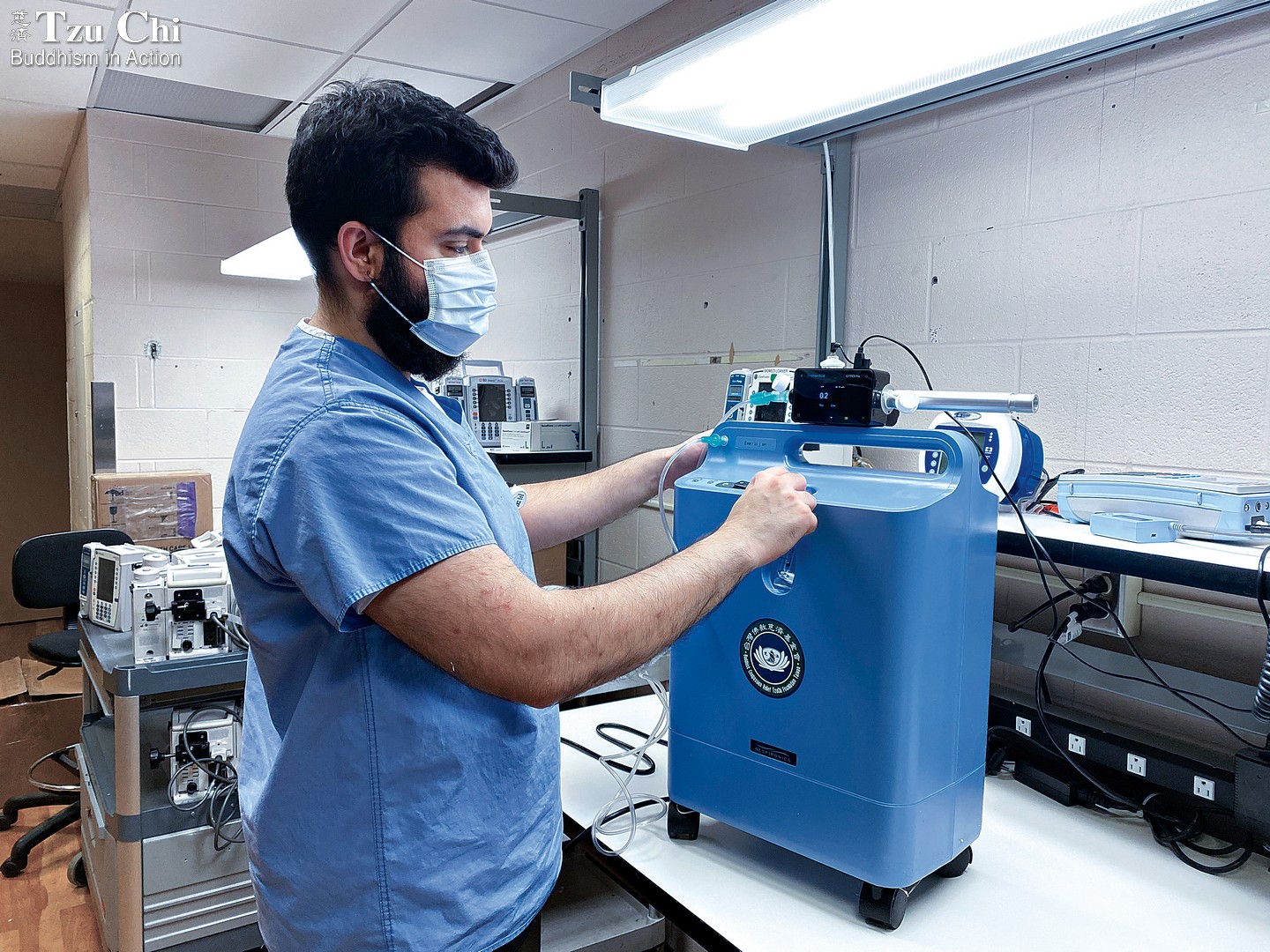
ZHU QI-CHENG
Africa
The Tzu Chi Foundation has provided anti-coronavirus supplies to the following countries in Africa:
1. Tunisia
2. South Sudan
3. Kenya
4. Madagascar
5. Mozambique
6. Zimbabwe
7. Eswatini
8. Lesotho
9. South Africa
10. Mali
11. Senegal
12. Burkina Faso
13. Benin
14. Niger
15. Mauritania
16. Sierra Leone
17. Sudan
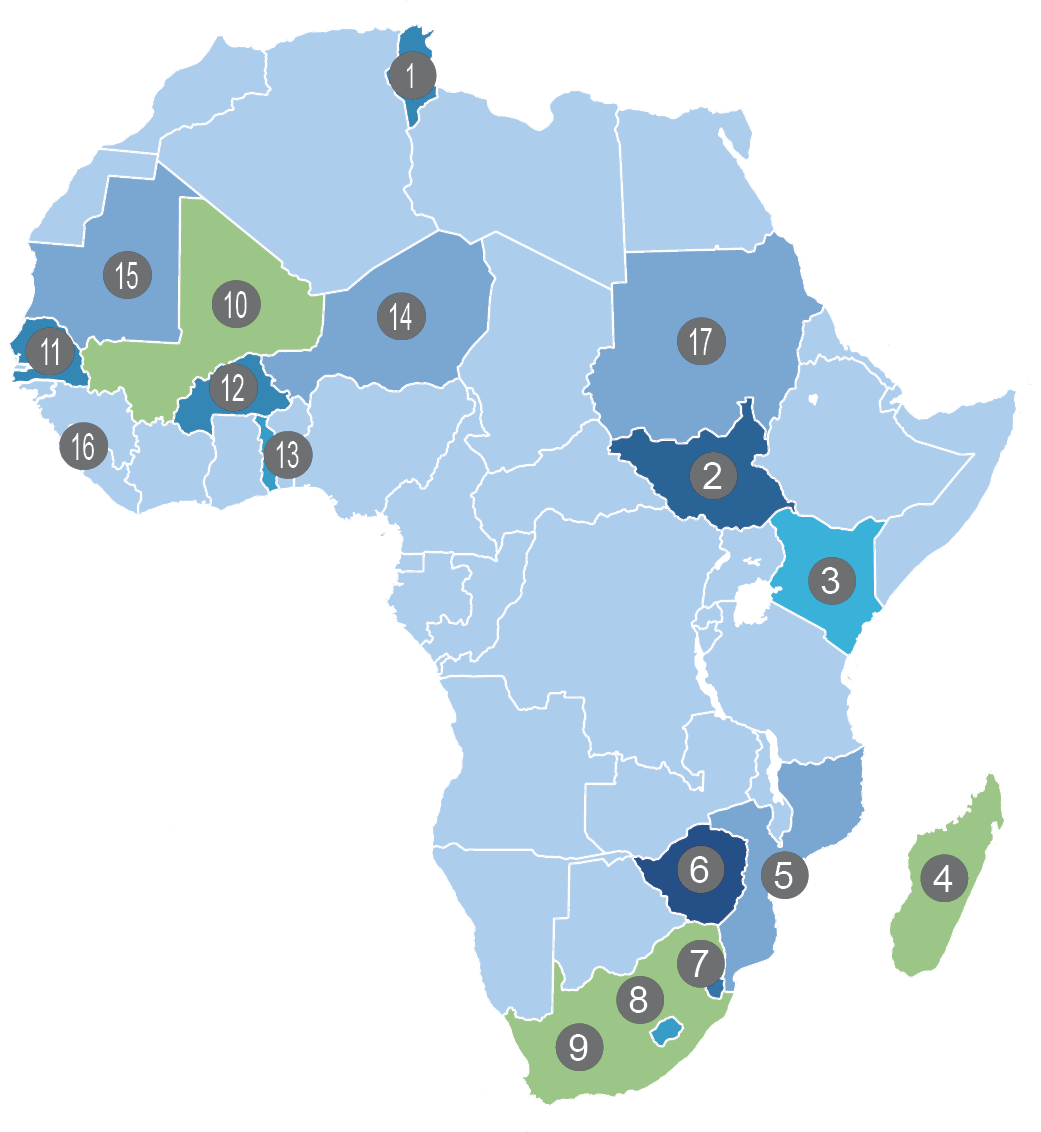
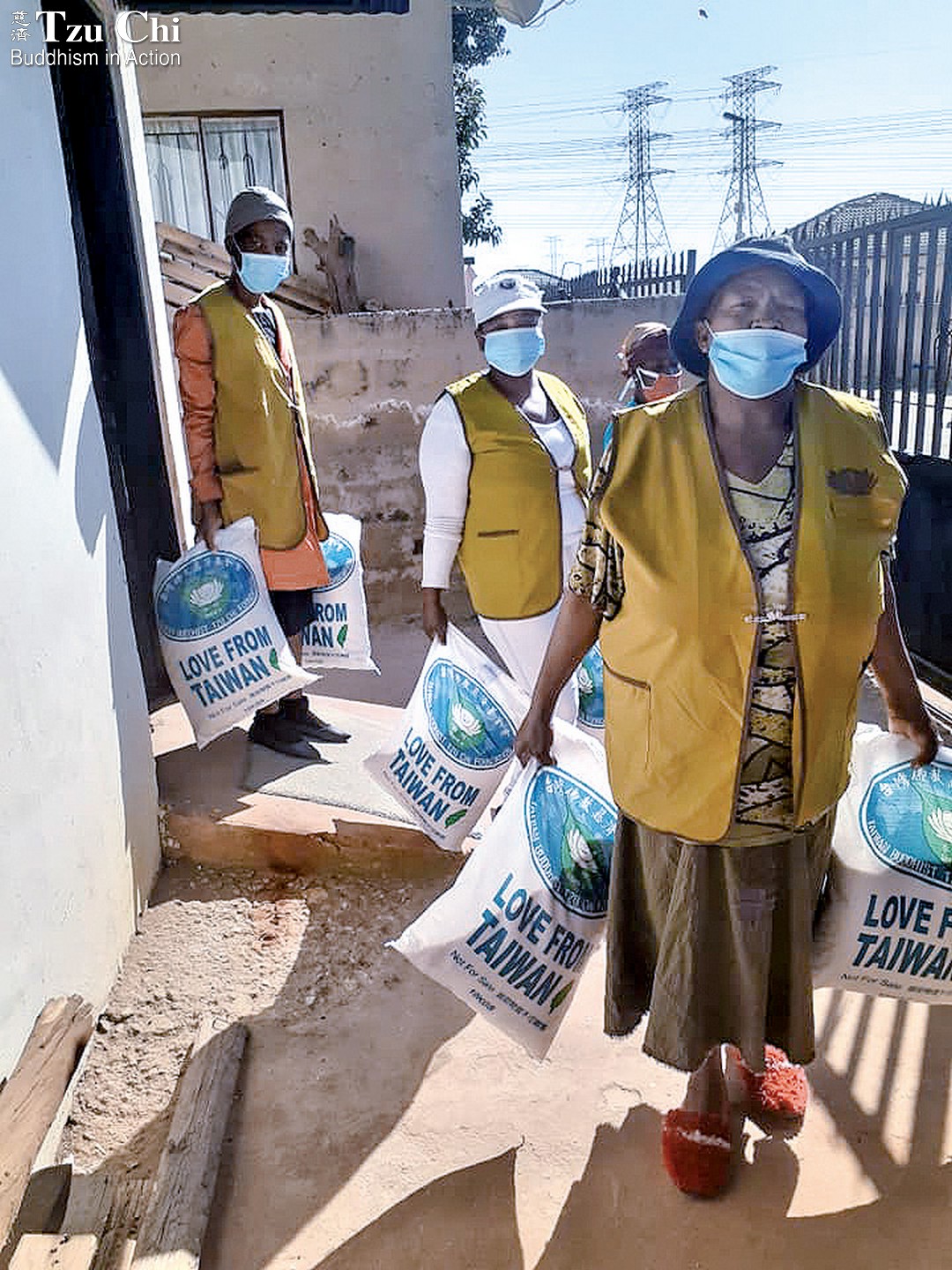
COURTESY OF TZU CHI SOUTH AFRICA
Johannesburg, South Africa
South Africa’s Minister of Health Zweli Mkhize confirmed on March 5 that the coronavirus had spread to the country. Soon afterwards, on March 15, President Cyril Ramaphosa declared a national state of disaster, which was followed by a national lockdown effective from March 26. South Africa has since registered more infections than any other country in Africa. The first batch of medical supplies provided by Tzu Chi arrived in the country in mid-May, which volunteers then donated to various hospitals. The lockdown took an economic toll on needy families, and many of them suffered from hunger. In response, volunteers in the township of Tembisa distributed food to help the needy survive the pandemic.
Maputo, Mozambique
A long-standing shortage of healthcare professionals and medical equipment left Mozambique powerless to defend itself from the invasion of COVID-19. Tzu Chi volunteers responded by delivering education and information to help local people fight the pandemic. They made videos to promote correct preventive measures, and worked with government health authorities by visiting communities to teach residents how to properly wash their hands. Volunteers also donated medical supplies to 12 hospitals and two testing centers.
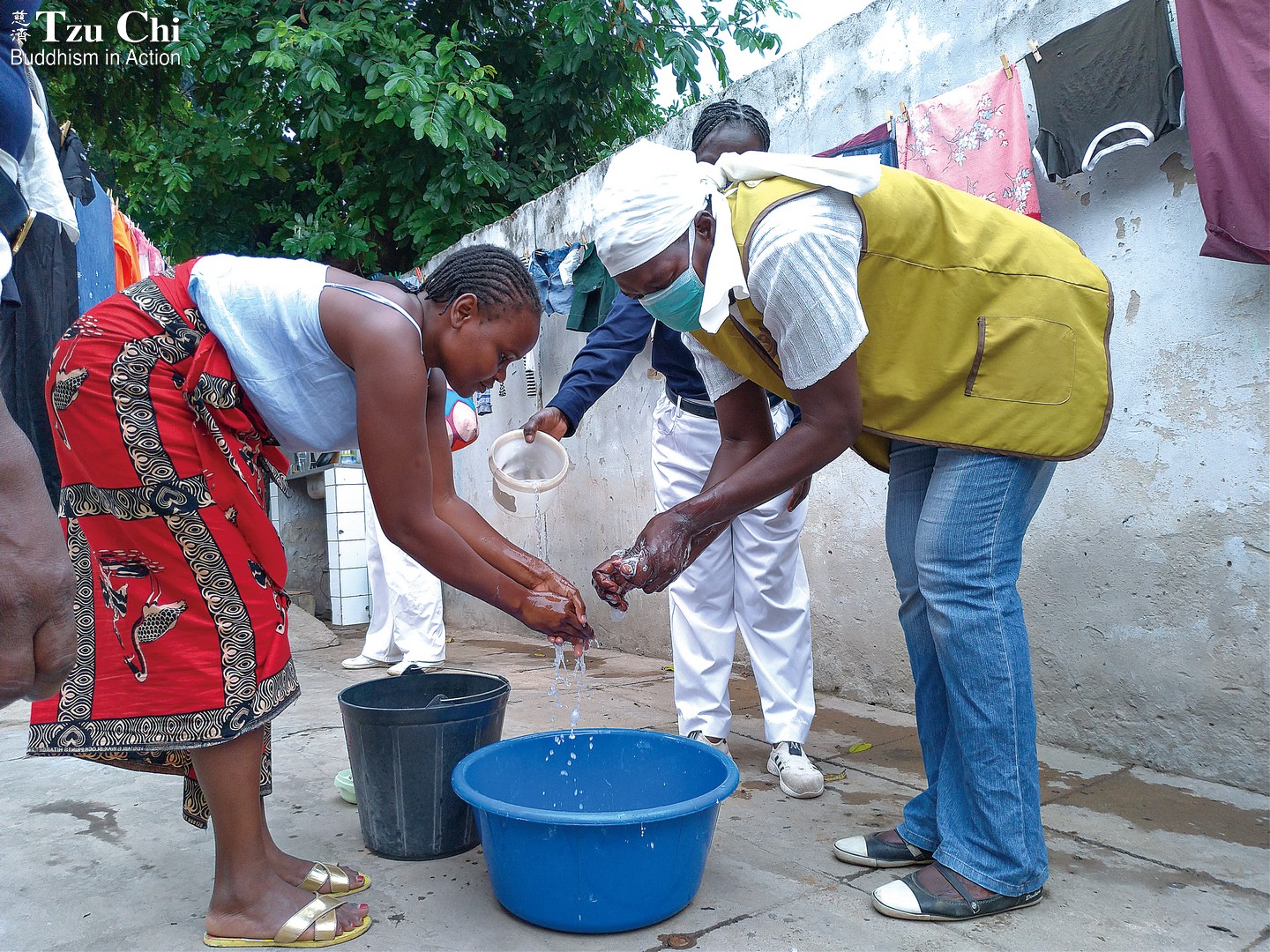
COURTESY OF DENISE TSAI
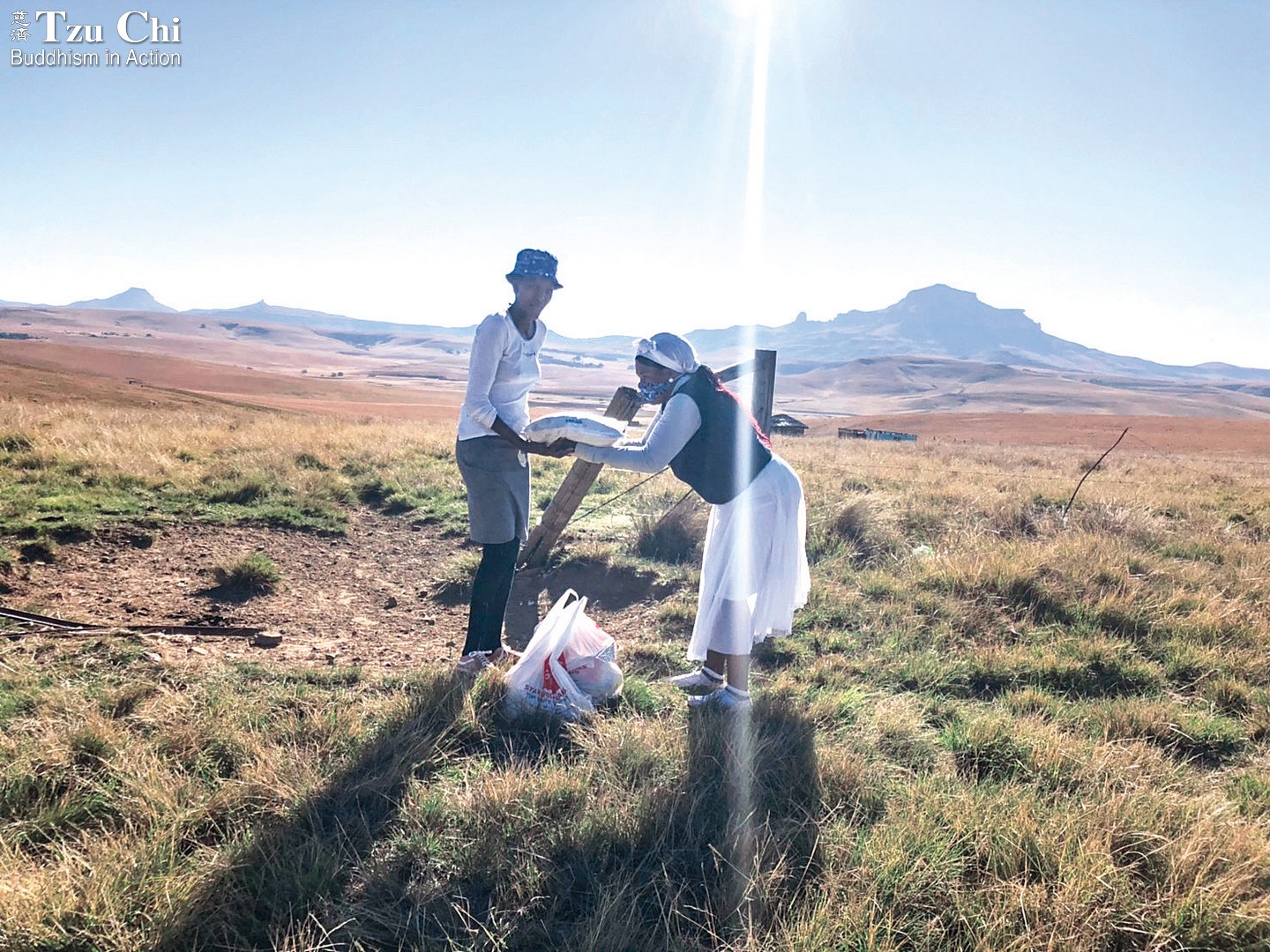
HUANG QIU-YUE
Ladysmith, South Africa
After South Africa was locked down, some villagers in Thabo Mofutsanyane, Free State, were in danger of running out of food to eat. Volunteers from Ladysmith drove 200 kilometers (124 miles)—about two and a half hours—to deliver food to them. Led by villagers on horseback, volunteers distributed the aid to 60 families.
Zimbabwe
Zimbabwe was grappling with the effects of a drought when the novel coronavirus pummeled the world. Many wells there had dried out, worsening the local health and hygiene situation. Tzu Chi volunteers led villagers in Domboshava, about 30 kilometers (19 miles) from Harare, the national capital, in drilling a well. When the well was finished, volunteers pumped it many times before the water finally cleared and clean water began gushing out.
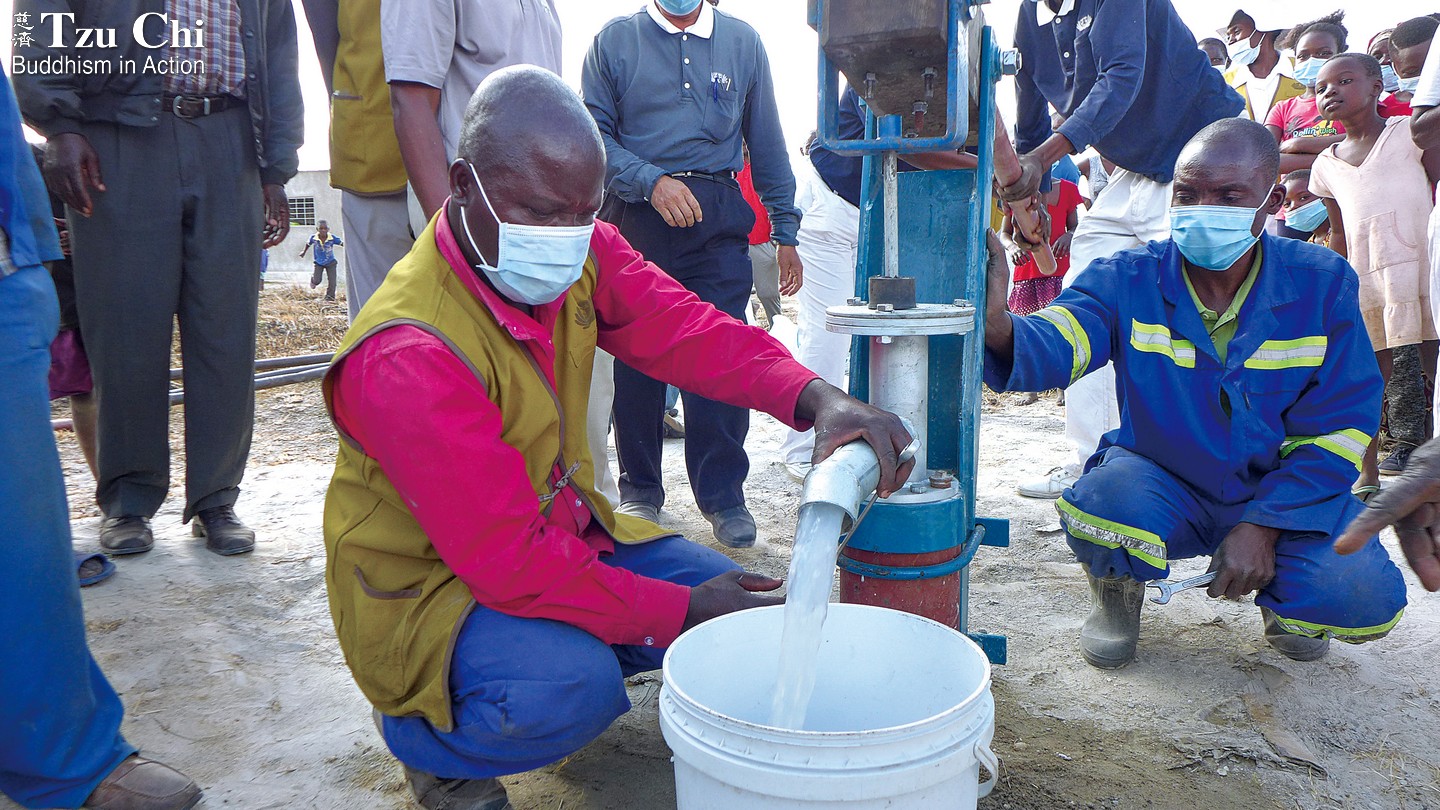
HLENGISILE JIYANE
Europe
The Tzu Chi Foundation has provided anti-coronavirus supplies to the following countries in Europe:
1. Russia
2. Ukraine
3. Sweden
4. Norway
5. The United Kingdom
6. Denmark
7. The Netherlands
8. Germany
9. Belgium
10. France
11. Switzerland
12. Austria
13. Bosnia
14. Italy
15. Spain
16. Portugal
17. The Vatican City
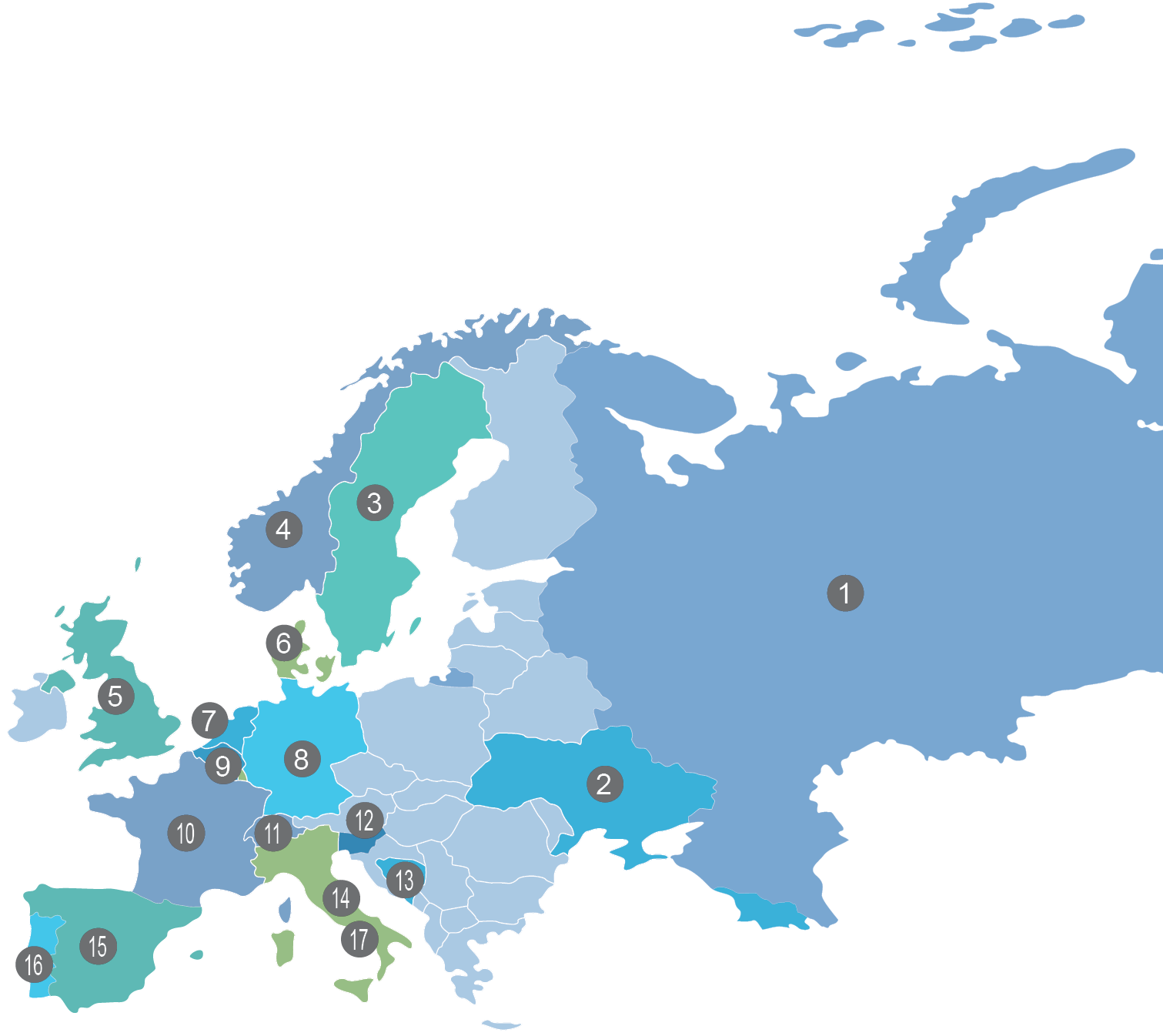
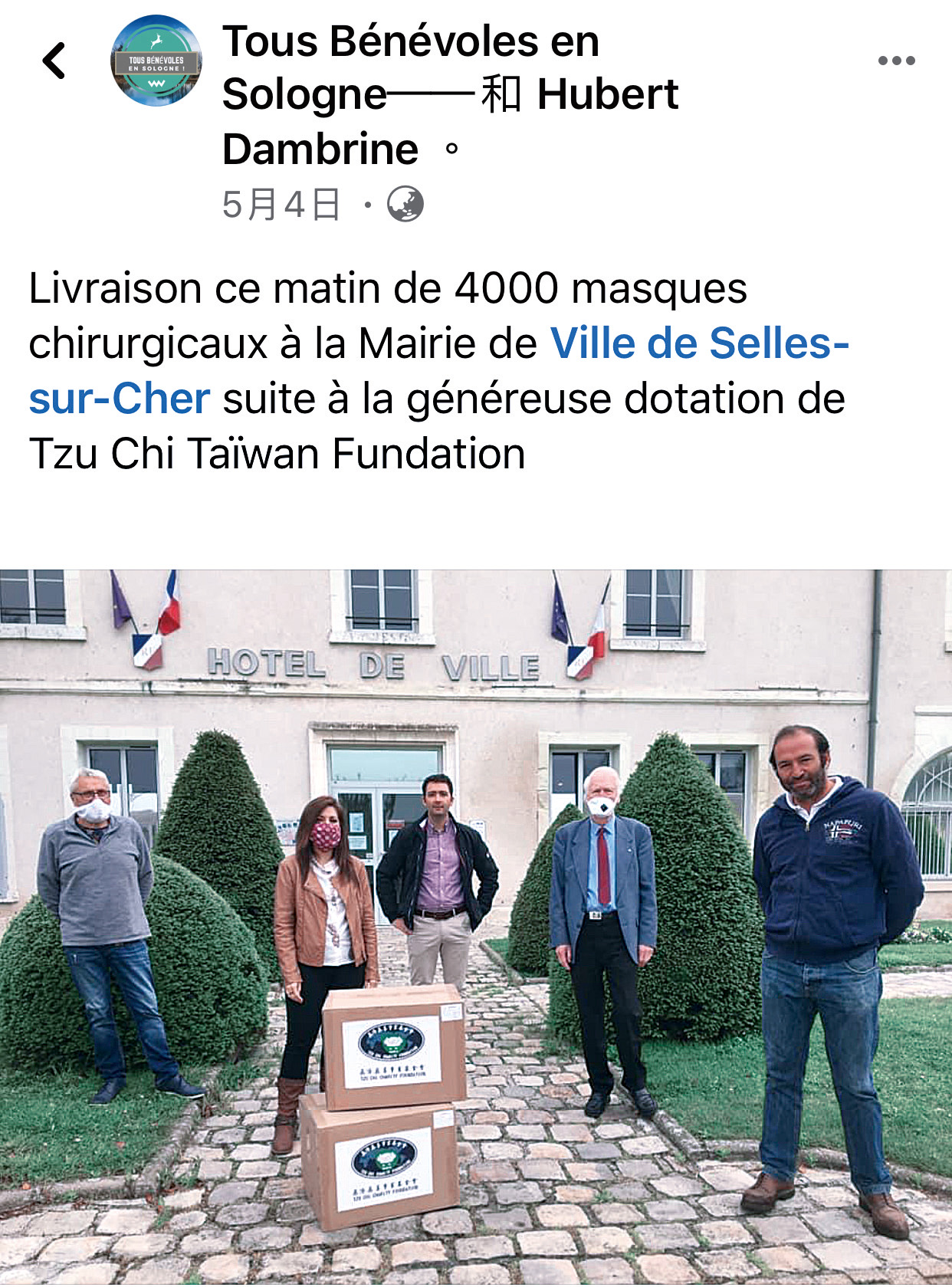
France
On March 16, in response to the pandemic, French President Emmanuel Macron announced mandatory home confinement for 15 days starting at noon on March 17. The order was extended twice and ended on May 11. During that period, Tzu Chi volunteers, taking advantage of the short time they were allowed to go out, mailed masks to Taiwanese students in France who were returning to Taiwan so that they could be better protected during their journeys home. Volunteers also donated masks, protective clothing, and gloves to a hospital in Bayonne, Centre Hospitalier de la Côte Basque, as well as the areas of Chanteloup-en-Brie and Sologne. The photo shows recipients acknowledging Tzu Chi’s aid on social media.
Germany
Eighty thousand medical masks provided by Tzu Chi arrived at Frankfurt Airport in April. Volunteers collected the shipment, then immediately headed toward Heinsberg, a region in Nordrhein-Westfalen that had been hit hard by COVID-19. Volunteers arrived at a supply intake center set up by the local government’s fire department and donated 20,000 masks there. The masks were then delivered to three hospitals in the area.
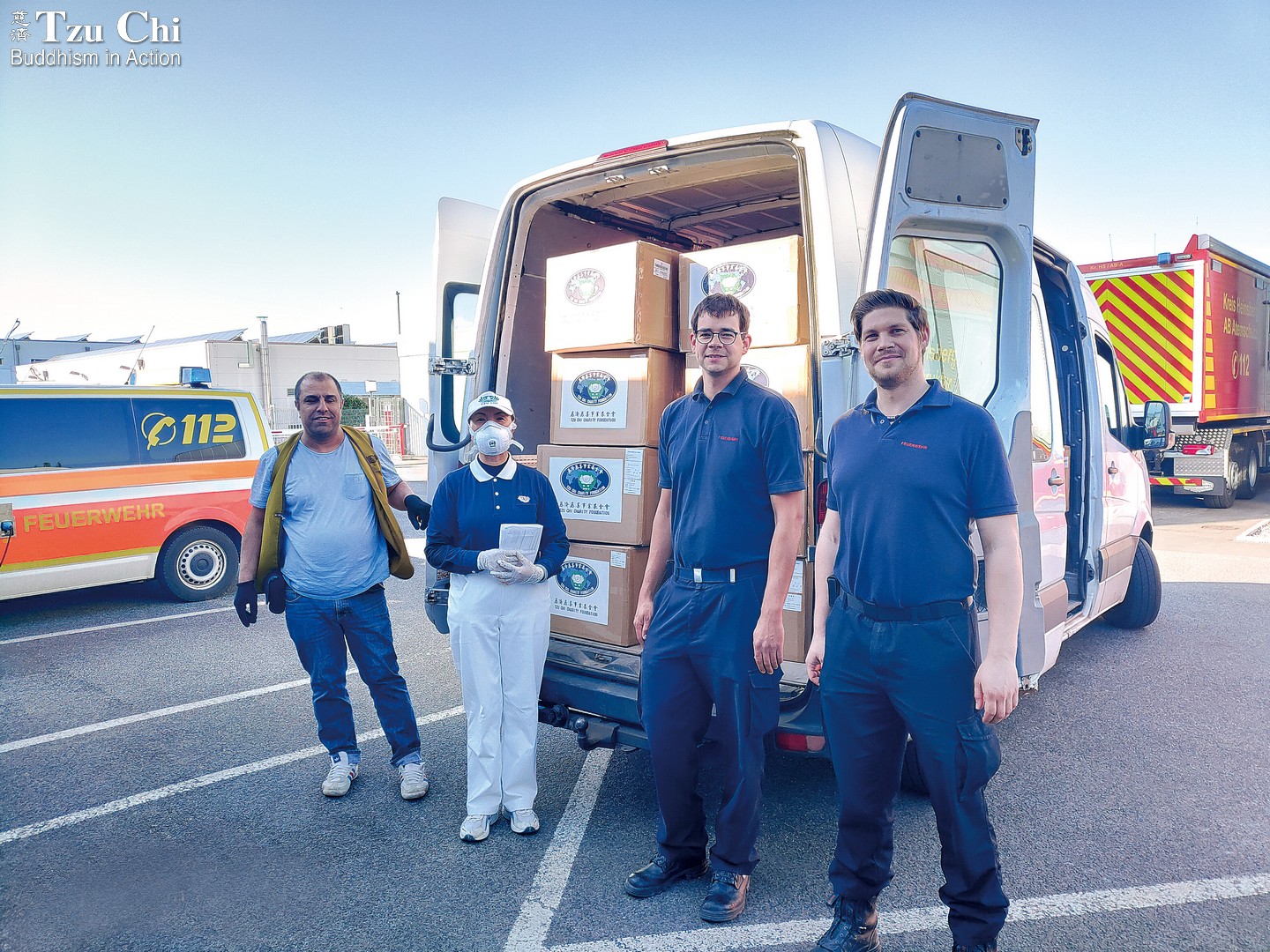
LIN MEI-FENG
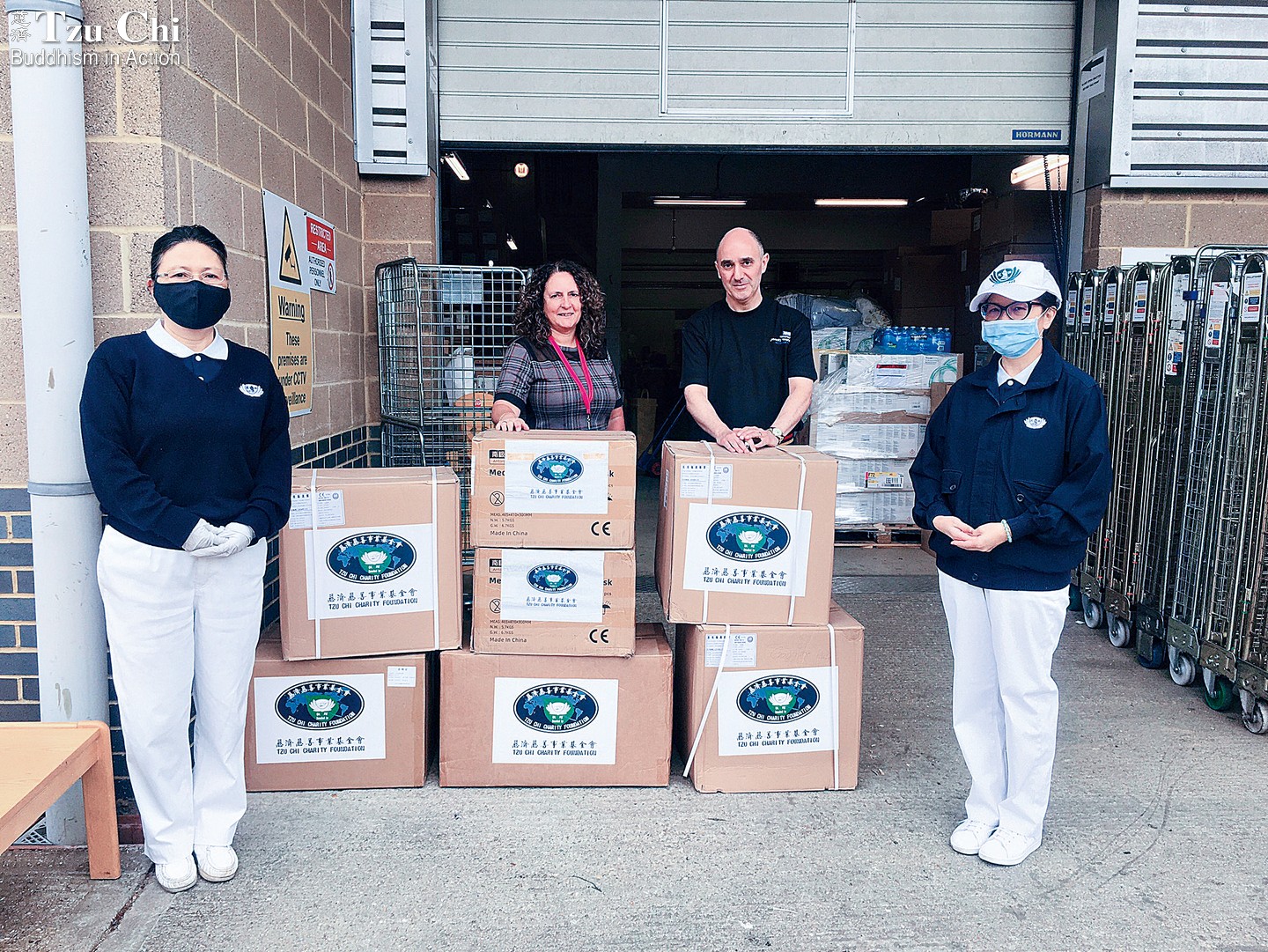
COURTESY OF LU JIA-HUA
The United Kingdom
The pandemic peaked in the United Kingdom in April. Tzu Chi’s anti-coronavirus supplies started arriving in the country on April 21, including 200,000 masks and protective gowns, which were subsequently donated to institutions in London, Cambridge, Oxford, Manchester, Edinburgh, Birmingham, and Malvern. Medical workers at Homerton University Hospital told volunteers that they had felt completely helpless when they saw their coworkers knocked down one after another by COVID-19, and so were deeply grateful to Tzu Chi for the donation.
Russia
In February, when the coronavirus situation in China was severe, a Tzu Chi volunteer in China, with the help of a friend in Moscow, purchased 6,000 masks from Russia. Later, when the pandemic went out of control in Russia—the number of confirmed cases there hit 500,000 in June—the foundation sent medical supplies to that country to help them fight the infection.
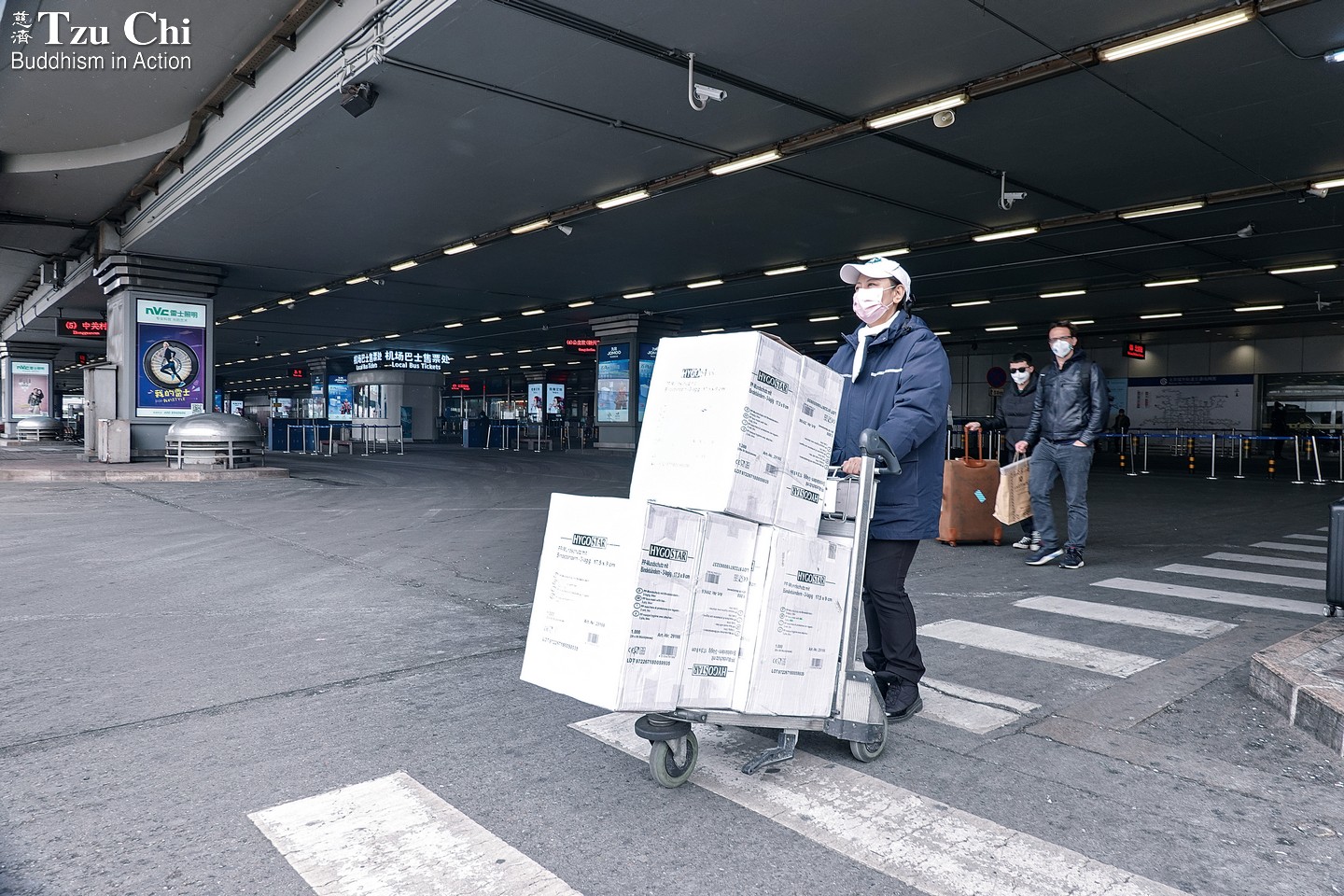
WANG YUN-XIU

